#once again legends origin on top
Explore tagged Tumblr posts
Text
as much as I like Cavan Scott and Dooku: Jedi Lost I can not wrap my head around Ky Narec willingly staying on Rattatak with A FORCE-SENSITIVE CHILD HE SHOULD'VE TAKEN TO THE TEMPLE for like about 20 years because he thinks he should be in exile??? I might have misunderstood it but that's such an insane concept. What would make him do that.
#daily asajj thought of the day#like yes i need to listen to the audio drama again so this might be completely incorrect but like#with a padawan#wait a sec#nope i am correct it is referred to as exile he practically decided to stay there for 2 whole decades#once again legends origin on top#HE WAS STRANDED#SHIP-WRECKED#like yes i know rattatak isn't as bad in tcw#and we don't know much about how ky ended up there#but it makes 0 sense for him to stay there for so long#fucking hell#sure he exiled himself but what about asajj#i don't like it#works much better when they're forced to stay there#like ok maybeeeee he thought she was too old for the jedi to accept her#still a weird move#and why didn't she go away?#she was like in her late 20s by the time he died#(dark disciple age retcon messes her timeline up so much ughhhhhh)#canon/tcw asajj has the weirdest amalgamation of origins and concepts because like 5 different writers wanted to do different things with#her#things that impact everything about her story#so it messes everything up#at least earlier legends asajj was simpler in that regard
2 notes
·
View notes
Text
Ask Masterpost 2/1/2025
Fourth edition! I changed some formatting things for better readability.
Summary:
Permissibility of creator-leaked/teased soundtracks (Not allowed)
Proposal of demographics poll
Permissibility of Simlish covers (Allowed)
What franchise has the most polls?
Permissibility of remixes of licensed music (Allowed)
Inquiry about duplicate submissions
Permissibility of pinball soundtracks (Not Allowed) and Inquiry about ports of older games
Permissibility of unused tracks in the game files (Allowed)
Permissibility of roblox game tracks (Allowed)
Highest "I like & I know it" song?
Inquiry about revealing the composer before the reveal
Proposal of demographics poll
"Can we submit 'leaked' soundtracks from games if the creator leaked/teased them?"
I'm going to say no, because there's a broad spectrum of scenarios that could happen in between the 'leak' and the official launch of the song that would technically make the 'leak' not indicative of the final product and of course you don't know that until the final product is released :').
----------
@pomrania asked:
Is there any chance we could get a poll on what people mean when they vote for that they like a song, or that it sounds familiar? For me, "I like this song" means "I'd want to listen to it again once it's revealed", and "it sounds familiar" generally means "I'm not sure whether I've heard it before but I might have" also sometimes it's "I know I haven't heard this SPECIFIC song before, but I recognize the motifs in it".
Or if that's not something you'd want to make a poll for, then I'd still be interested in seeing what people say for how they vote on things, like in the comments.
I think this would be super interesting to do for a special event or something like that! I've been curious about demographics and other general statistics for a while now. I'm actually starting to have quite a good rhythm with managing the blog now so I may begin implementing the fun side ideas I've had sometime soon (or at least, I hope so, this semester is looking rough LOL)
----------
Can we submit simlish versions of popular songs, like simlish Katy Perry?
They're remixes for a game so absolutely! I think we already have some in the submissions queue.
----------
Which franchise/game has the most polls?
It's probably destiny (forlorn, distant stare).
----------
@haellen-o asked:
Is licensed music created/remixed for video games allowed?
(examples being the version of rob zombies dragula in the original jet set radio. And ludens by bring my the horizon)
It's an official remix for the game's soundtrack, so absolutely :).
----------
Out of curiosity, how often do you get duplicate requests from different people (or maybe the same person, worried you never got their first response, lol)? I think you've said you have around 7,000 requests, is that after removing duplicates or before?
We honestly have a lot of duplicate requests for popular games, and we've been shaving down the duplicates as we go along and queue new submissions. I think we've cut down AROUND ~1000 duplicates so far (we're not done!) and these are mostly very popular (at least on tumblr) games such as disco elysium, sonic series games, in stars and time, final fantasy, pokemon, tf2, mass effect, hollow knight, legend of zelda, just off the top of my head. The 7000 number was from before removing duplicates.
----------
for older games where the music is ported to different consoles, would the soundtracks be considered separate if the soundfonts impact them enough, or do they have to be very, VERY different? Like if a game was released on pc vs a 32x port.
Also, if a pinball cabinet includes a soundtrack, is that considered a video game soundtrack?
I would honestly just submit your PREFERRED version (if the soundfonts did differ), and I would put BOTH versions into the reveal, since I don't think this is a common enough occurrence to be significantly obnoxious/unfair for whatever reason. As for the pinball question, last masterpost answered overwhelmingly 'no', so I'm going to say no as well :').
----------
Are unused vgms allowed for submission? So in the files but never added to the game itself.
If you can credit the creator of the tracks then yes! (provided they're in the files in the final publicly released version and not from a demo/waiting for a future update to be implemented in a live service game/etc)
----------
are roblox games allowed?
Yes, if you can credit the creator of the tracks and they were made for that roblox game :).
----------
what song had the highest "I like it and I've definitely heard it before" percent?
I think it is still #100, which was Megalovania from Undertale (85.20%) Correction: It's Death By Glamour, #460, at 87% :)
----------
@enderlordisadumbusername asked:
are we allowed to mention song composers before the song has been revealed?
Absolutely!!!!!!!!!!!!!! And please do!!!!!! (This will literally only give away the game if you were already familiar enough to know the composer, so it's actually very perfect)
----------
Would you or have you ever run a poll to gauge how much of a song your followers listen to before voting?
Definitely considering it after learning a lot of people don't listen to the full song or even at least the first minute...
94 notes
·
View notes
Text
Thinking about the Karnstein family connection thing.
Laura's mother is descended directly from the Karnstein bloodline.
Carmilla is/was Countess Mircalla Karnstein.
While the gothic (and some classic vampire lore!) elements can easily point to an incestuous implication for why Millie is so fixated on Laura--what with some vampire legends focusing on undead that pursue family members first--I think the more straightforward hint is that Mircalla married into the Karnstein lineage and died/got vampire'd young, before she could produce any heirs.
While we'll learn later that ye olde Millie had multiple lovers, including a certain young man who will become important later in her revealed history, I think it's worth noting that Mircalla, prolific in romances as she was, did marry, and did choose a Karnstein to do so with. Which suggests one of two options to me:
A) Count Karnstein had her heart (Surprise! She's Bi!) or
B) It was a marriage of convenience and her heart belonged to some unknown lady Karnstein
Either way, this is the biggest sign to me that Carmilla not only has a type, she has a specific craving for Karnsteins. And, in case it needs yet more emphasis, I am shouting from the top of the castle roof that CARMILLA AND LAURA DESERVE THE REINCARNATED LOVER SUBPLOT MORE THAN ANY OTHER VAMPIRE LOVE STORY!
Because think about it! Why else would Carmilla/Mircalla zero in on Laura as a literal child before ever slinking up to her in late adolescence? What was the point unless she got a spiritual ping from the girl that was too familiar to ignore?
“Darling, darling,” she murmured, “I live in you; and you would die for me, I love you so.” I started from her. She was gazing on me with eyes from which all fire, all meaning had flown, and a face colorless and apathetic. “Is there a chill in the air, dear?” she said drowsily. “I almost shiver; have I been dreaming?”
What if this is Carmilla 'dreaming?' Thinking back to the original lover, either the Count Karnstein or some secret partner who ended themselves once upon a time in grief. Before the risen Mircalla could have turned and kept them. Would it not make so much sense that she would see Laura, sense the returned soul in her, and throw herself at her as soon as she could? Just to be sure at first--
Hence the childhood visitation, hello, hello again..!
--and then the instant she was of age--
Oh dear, all alone in these woods? No Bertha to be your only young companion out here? Not to worry, darling, I am here for you...
--and last, if the implication at the novella's end is more than Laura's imagination, seizing upon her as a grown woman.
Found you again, darling. No more dawdling. I shall not wait for another string of lifetimes to have you.
just
aauaougghh
Let Mircalla x Mystery Karnstein slowburn Reincarnated Lovers fic happen, please, I need it, my crops are dying p l e a s e
89 notes
·
View notes
Note
I’d still like to know what you consider copying if you’re willing to answer! ^_^
I just look back and realize you asked about "artstyle", which I don't really have an answer for. I believe artstyles are meant to be "adapted" and "improved" and there's nothing too definite to be called "copy artstyle" for those who genuinely want to learn. Ah, but there are still some shitty examples, so follow me down on this...
For example: Rei17, is known for being an absolutely massive A-hole and treating people like shit, but also a legend for having the most magical use of colors, lighting and composition, along with a perfect dynamic for anatomy.


That is to say: an "Artsyle" is made up of many elements. One cannot copy an artstyle if one can't copy everything that artstyle is made of, and that's a LOT of work, especially to copy a master of masters like Rei17. Instead, they mimic some fractions, that make things easier. But then that's not "copy artstyle" anymore, that's "copy concept", "copy color", "copy composition", etc... and suddenly it's not really very "copy" anymore because when we break it down, those fractions becomes "knowledge" that's really "learn-able":
For example: Turn out Rei17's color skill is a very clever use of color theory and by learning about it, many and many other artists can also use it so vividly, without even looking remotely like Rei17's "artsyle"

Taro-K from TamoTaro
Or you can have some cases who tried to mimic everything - the entire artstyle, and fail miserably. For example, this artist I know from some time ago:

left: copy works from that artist and right: original works from Rei17

above: copy works from that artist and below: original works from Rei17

Now, this is called traight-up copy too, I think you can see why:

left: copy work from that artist and right: original work from Rei17
this artist also copied Azling

and once again failed miserably because he lacked the knowledge and didn't understand the fundamentals behind the drawing :)

Now that I saw those messy lines without a horizon line or focal points again it indeed reminded me of something.... ah!


Now, joke aside, I honestly cannot give more insight into this problem since I'm not exactly too keen on just one artstyle myself. BUT I know it when someone learned from my "concept", "paneling", or shits like that, and especially my "designs".
I remember one time there was an artist, who appeared on tumblr dot com one day, and drew their Whitney with the exact choker tattoo I gave my Whitney, with the exact 4 little triangles on the side too. And when I reached out to them and said I was more than happy to let them use my design, but they needed to know the "lore" behind it, they admitted that they saw my drawings on the top tag and just thought it was a common thing, and despite my efforts to communicate, they never reply again, and then fade away with all their drawings......
Mystery...
Recently, I reached out to some artists I've noticed were kinda of copying or referencing my works, and to my relief, they all admitted their wrongs and were willing to make up for it. For example, when I put a drawing that references my work, side-by-side with my drawings like this, do you see the issue?
This case is not the only one, but it is the mildest of the conversations I have had in the past few days addressing almost the same issues. I've asked the artist for permission to use this drawing as an example of obvious referencing.


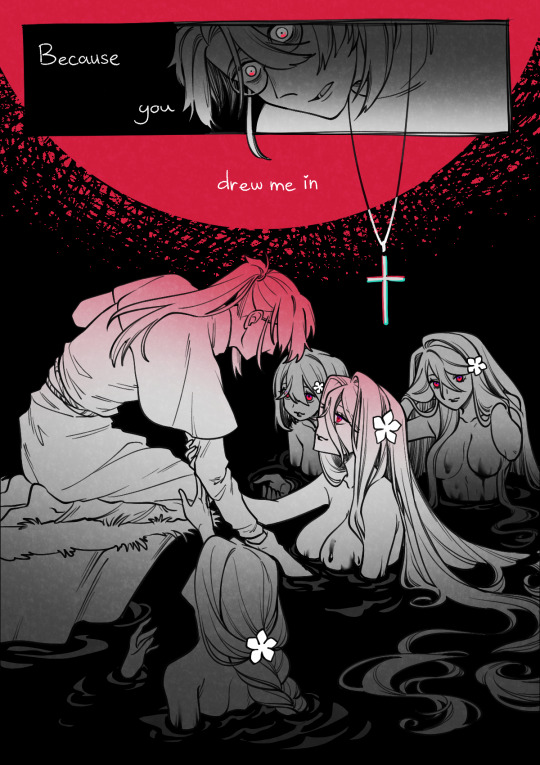
yup, they admitted they learned from my work but did not ask because they were "shy and afraid of asking because that would bother" me.
And to that, I say: "ALWAYS REACH OUT AND ASK FOR CONSENT FIRST". If you can ask, just ask. If given permission, wonderful! And if not, oh wew I just avoided upsetting my fav artist any further! Or if the artist doesn't respond: oh I should still be respectful and give them the credit. Do it, be respectful, and give credit to your source of learning because confrontation is never a nice thing to face.
And if you want to ask about copy and heavy ref in Designing, especially Character design, I think that'll have to be for another day because I'm so tired now U_U) I hope this post can clear up something and give someone who needs it some insights
And remember: ALWAYS ASK FOR CONSENT AND GIVE CREDIT!
#dollya ask#gosh it's been long since I last use my brain like dis#I'm really not built for thinking#but here we are#dollya art
92 notes
·
View notes
Text
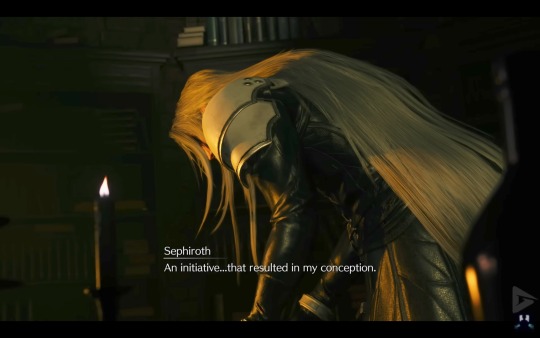
FFVII Rebirth introduces something never extensively explored in the original game or in the compilation of Final Fantasy VII: Sephiroth's anger towards Professor Gast’s experiment and the contempt he came to harbor towards ShinRA as an organization.
(Herein lurk spoilers.)
While the latter is something the fans have glimpsed on and off throughout previous installments, the second part of the Remake amplifies it ever so more. What began as admitting that the company had fabricated his legend and expressing a desire to live a normal life in Ever Crisis gradually transforms into a lack of clarity regarding his reasons for fighting in Before Crisis (as prompted by Elfe), followed by an open disgust towards Hojo's and Hollander's experiments when confronted with Mako pod entities during the hunt for Genesis. Sephiroth and Zack's ordeal during Crisis Core events appears to undercut his willingness to stay, as he famously considers leaving the corporation right before embarking on the ill-fated Nibelheim expedition.
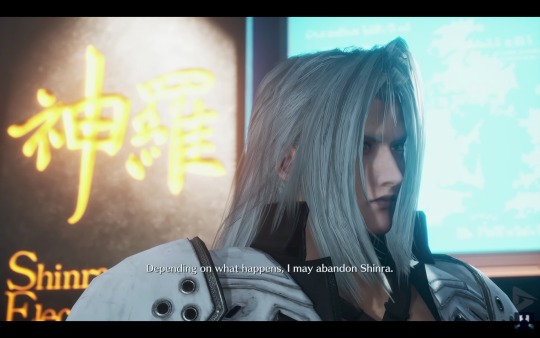
FFVIIRb picks off where we left off, painting a more complete picture of Sephiroth's dissatisfaction with ShinRA overall. Interestingly, one of the discarded sequences from the original game featured Sephiroth hinting at his lack of affection for his employer as early as the truck ride.
Narratively, the sequence spans the gap between OG and Crisis Core's departure cutscene, implying that Sephiroth used the time on the road to reflect on his current and future connection with ShinRA. His companion, however, does not appear to understand why he is bringing the topic up. What distinguishes Rebirth is the suggestion that Sephiroth came to view the entire ShinRA system as a problem, rather than just a few rotten apples. He no longer singles out Hojo, but rather the entire ShinRA branch, indicating that something's wrong with the system. When "Cloud" casually inquires about the problem with the Nibelheim reactor, Sephiroth responds that it is "people who run it," adding that this particular site is controlled by the Research and Development department. In addition, in response to "Cloud's" fair comment regrading the lack of transparency in company's operation, he rather sarcastically suggests to bring the issue with the President, thus implicitly conveying the futility of the endeavor.
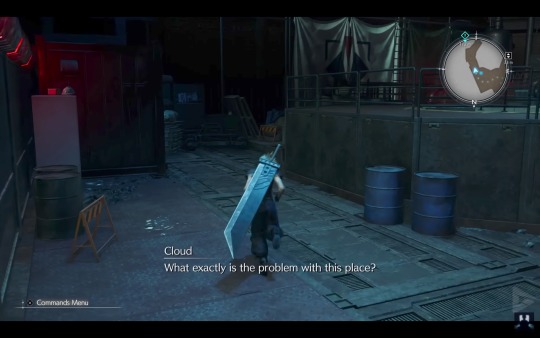
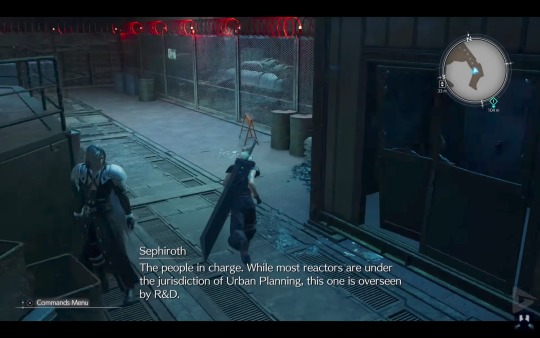
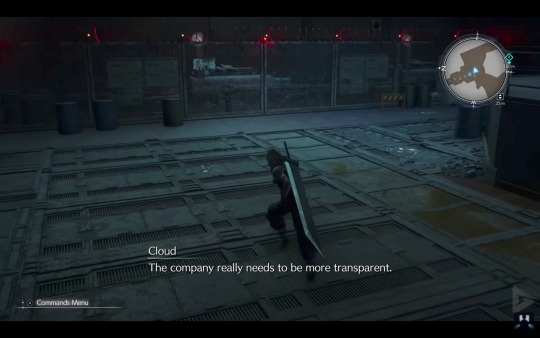
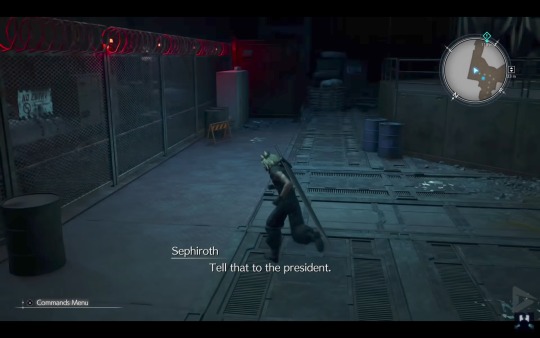
When the party encounters Mako pod residents, one can detect genuine rage in his voice. While Sephiroth had previously shown bitterness for the test subjects during CC, it was tinged with disgust/pity rather than wrath. And once again, I’m grateful to Tyler Hoechlin for broadening his range in this particular segment.
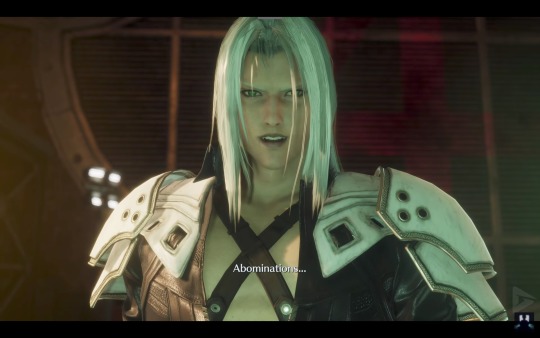
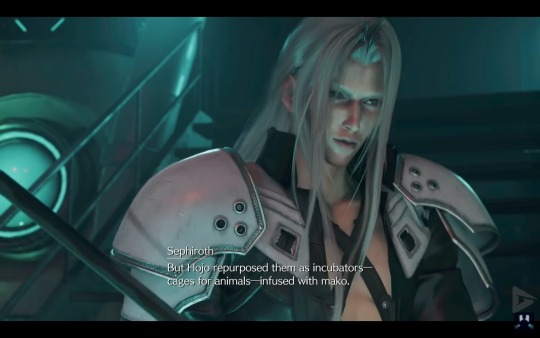
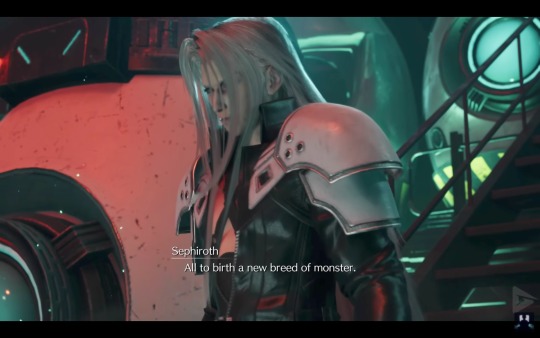
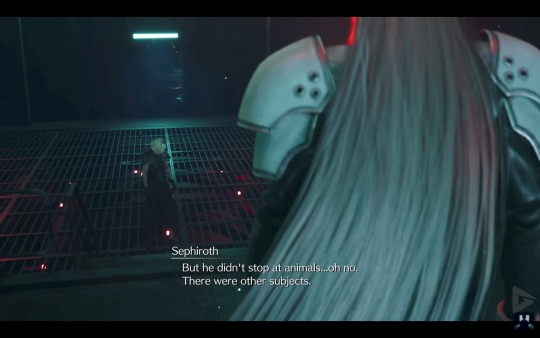
"Cloud's" reaction to the contents of the pods, however, came off a little weird. The confusion appears out of place, because Zack had seen it all before — he had been there to watch the aftermath of Hollander's work; is it really odd that ShinRA's chief R&D scientist spearheaded the entire thing? Perhaps, unlike Sephiroth, Zack treated it as a rotten-apple issue, rather than a systemic issue. Or maybe this is an example of Cloud being an unreliable narrator, having conflated his own experience with that of Zack, which also explains Zack being sort of too green for the First Class throughout the Nibelheim portion of the game.
The shift in Sephiroth's perspective, from singling out Hojo's misdeeds to viewing ShinRA's itself as a systemic problem, is further highlighted during the mansion segment. This is no longer a strictly Hollander or Hojo issue. Human experimentation formed the fundamental core of what ShinRA is now, and those were approved from the very top. As Sephiroth puts it with barely concealed disgust, as soon as the company realized what had fallen into their hands, they became ambitious.
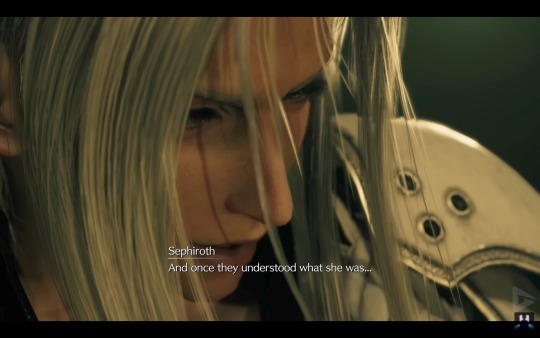
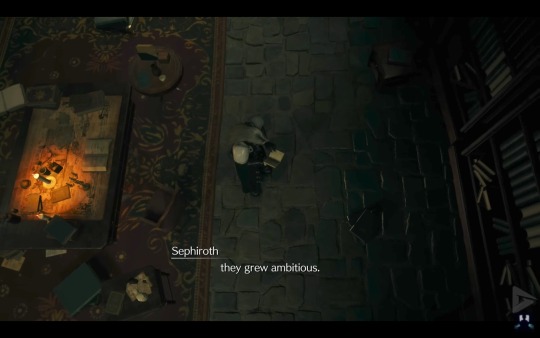
The wording also strikes a contrast to how he used to refer to the company in the past; as such, when Angeal deserts, Sephiroth states that Angeal has betrayed “US”, which points at both his personal connection to the person and the fact that Sephiroth likely saw himself as part of ShinRA circle. In the library, however, he distances himself by referring to the company as THEM, thus no longer perceiving himself as a part of it.
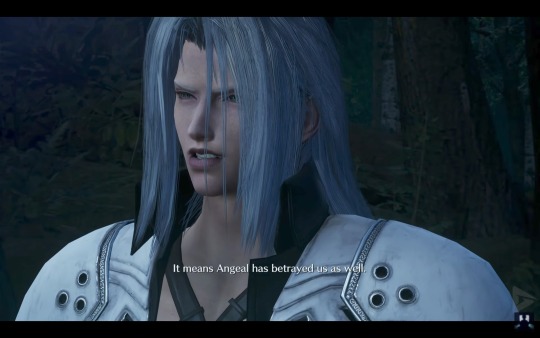
More important still is the rage he expresses when quoting excerpts from Gast's notes. The anger is new, never before seen touch. Sephiroth has been portrayed in the moment differently throughout earlier installments — dejected, perhaps overwhelmed, but never angry enough to snarl and nearly flip the table.
And it's wonderful. It's authentic, and it makes sense. It makes you question how much of that rage has been bottled up, compartmentalized, and never fully processed throughout the years. That rage should have existed, but was suppressed by ShinRA, before becoming internalized and sealed.
The scene is extremely on point on another level as well. As the flash of rage passes, and Sephiroth looks away, hiding eyes behind bangs — a gesture previously briefly appearing in Crisis Core.
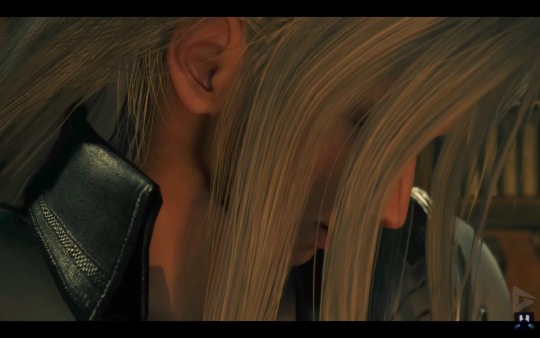
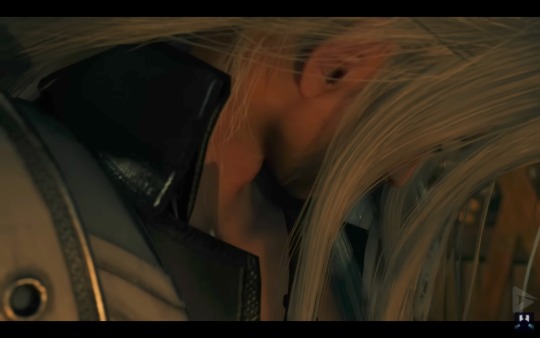
One could interpret the body language as being ashamed and unwilling to show his composure cracking. Even in this state he KNOWS he wasn't supposed to let anyone see hurt or anger, wasn't supposed to lose cool. The "wonder child" and the "poster boy" is not to be seen as something other than “efficacious” and “collected”. The habit of suppressing displays of emotion or physical/psychological ailment had apparently become a part of himself. It doesn't take a lot of imagination to deduce why the habit persists. The internalized compulsion to live up to the expectations placed on him by ShinRA and the myth it imposed on his character, as well as the internalized imperative not to reveal to someone like Hojo — anyone— the extent to which their acts or words affect him. There's also another layer to this shame — one of being an artificial creation, but that's for another write up.
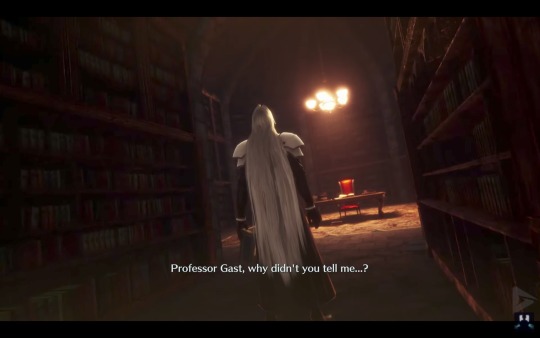
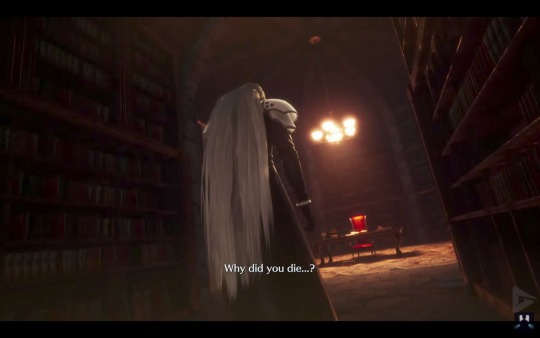
The anger towards Gast differs greatly from the way Sephiroth went “Why didn't you tell me?” in previous iterations of the Nibelheim incident. In retrospect, Gast's supervision of the project, involvement in Sephiroth's life, and unexpected departure seem like a betrayal. Gast had not only abandoned Sephiroth, who had likely come to see him as a salient figure in his youth, but had also been lying to him all along, until finally discarding him, as Sephiroth might believe. Gast therefore falls from grace, becoming yet another person who misled, attempted to exploit, and eventually abandoned him to deal with the consequences on his own.
#sephiroth#ff7 rebirth#ffvii rebirth#final fantasy vii rebirth#ff7#ffvii#final fantasy 7#ff7 remake#ffvii remake#ff7 crisis core#final fantasy vii#ffvii@luv fandoms
381 notes
·
View notes
Text
Cottontails
Part 2.
Legend x reader
Sorry of the ending seems rushed, I have a headache but I really wanted to get this out, I was excited.
Also something to note: rabbits show dominance by being groomed, so by licking the top of your head he was basically crowning you royalty/leader. If that info is incorrect, blame a tiktok comment I read today while watching a rabbit throw a tantrum bc he hated a cat’s tail

You were running for your life. You didn’t know where you were going, and you didn’t particularly know why, but you were terrified. You looked around for anywhere to hide.
Why did you run? You knew the vet. You loved the vet. He was your best friend—even with every jab. You knew he was never serious when he teased you. But here you were: small, grey as storm clouds, darting every which way after falling into some of his items. You felt like he’d kill you after finding out. Again, you didn’t know why. You’ve never felt like this before, you always trusted him…
“Y/n!” You heard a voice behind you. That was him. The vet. He didn’t sound angry but you couldn’t suppress the need to hide. You dove into a hole in the ground, little tiny claws digging to make it deeper.
。・:*˚. • ☆ . ° .• °:. *₊ ° . ☆ .☾ ⋆*・゚:⋆*・゚✧˖*°࿐ *ੈ✩‧₊˚ ˚➶
The veteran looked around, finding a hole. He hopped over and looked into it, tiny nose wiggling as he sniffed around for that familiar scent of you. He caught it his eyes softened. He shuffled down into the hole to find you at the very end of the small tunnel, pressing your body against the dirt.
“Hey, hey it’s me. It’s just me… you’re alright.” He sat with some distance between the two of you, giving you space.
Your eyes raked over him, taking in this form. You’d never seen him like this… then again, it sort of made sense. The two of you have had long, late night conversations about your inabilities to commit. To love, after experiences you’d had. You were both bolters. The both of you being rabbits made perfect sense.
“…you’re a rabbit…” you muttered. He huffed a laugh.
“So are you.”
“You’re pink…”
“You’re grey. You look like a storm cloud.” He hopped over.
“…you’re not mad about me knocking your stuff over? And about getting all into your magic powder..?”
“Why would I be, cottontail? It’s not your fault.” He brushed his head under yours, ears flattened down. Your heart sped up.
“You had me really worried…” he said. “I didn’t know if something was gonna get you, or I just wouldn’t find you again…”
“You were really that worried about me?”
“Of course…”
You two heard voices outside the tunnel. The rancher and sky were looking for you.
“We should go. You need to get back to normal and so do I.”
“…we can’t stay like this a little longer..? I kind of like it.” You laughed. As did he. He licked the top of your head.
“It’s best if we don’t. I don’t know what effect it would have on you. Follow me.” He led you out of the tunnel and the two of you found sky and the rancher. Sky placed the master sword on the ground. “There you go..”
“I’ll go first… I need to wake you though, cottontail. It’s not gonna be fun. It’ll hurt, a lot… but you’ll make it through.” He nestled his face under your chin. “You’ll be okay. I’ll help you get through it…”
“…vet I’m scared…”
“I know. But it’ll be okay… I promise…” he left your side and hopped over to the sword. He put his little paws on it and transformed back into himself. He looked over to you with a sympathetic expression.
“It’s okay..” he held the sword out to you. “I’ll be right here…”
You stepped up cautiously and held your paw out, placing it on the sword. Your body contorted, doubling over in pain as your bones shifted and you returned to your original form. Your rabbity squeaks turned into humanly groans and whimpers as you changed back, pain nearly unbearable. The vet picked you up gently once you were back. “It’s okay, cottontail. I know it hurts… we’ll get you a red potion once we’re back to camp…”
You leaned your head on his shoulder, and entire body aching like you had the flu, but the pain was tenfold. You’d prefer the flu at this point. He took you back to camp and held you as you recovered, ignoring the glances and grins from the rest of the chain.
You and the vet shared something special now. You had before—a kindred spirit, even if your personalities differed a bit. Even if you were sunshine, and he was midnight rain. And now he knew why you always felt connected to each other. You were made for each other, it seemed. Behind that hard, tough, spiked and guarded exterior, the veteran had the soul of a rabbit. A bolter. Cowardly by no means, but it did mean he was soft. Kind, gentle(for the most part), and stubborn as ever, just like a rabbit—and he knew it. Just like his hair, now a vibrant pink again, there were some parts of that he couldn’t hide. The moment he saw you, he knew this had to be a bond for life.
When you finally came back around and were no longer in immense pain, you stuck close to him. It seemed some of those instincts had yet to leave your body. The idea of being separated from the vet made your heart spike—and he noticed, so he stuck close to you as well. Again, a bonded pair. The events of the night had been going through both of your minds since getting back to camp. There were some moments the vet would rather not discuss, certainly not now. His feelings could be a conversation for another time.
But, you had other plans.
“Vet..” you whispered. Everyone besides the two of you and the old man were asleep, and he was over on the other side of your camp, patrolling. You and the vet lay side by side in your bedrolls, legs touching.
“Hm?”
“Earlier tonight, when we were bunnies… you like.. licked the top of my head, and kind of like… nestled under me. Was that like a kiss?”
Theeere it is… he was thankful for the dim lighting, otherwise you’d be able to see his face was the same color as his hair. “I uh-…don’t know how to answer that.” He huffed a nervous laugh. “I’ll cut to the chase… I really like you, if that’s what you wanna know… a lot…. I don’t know how any of this works, i haven’t trusted anyone like this in so long…” he sighed heavily. “But I know you’re here, and you’re real…. And I’m okay with trusting you. You trusted me with your life back there. So I’m trusting you….. please don’t make me regret it.. please…”
You just smiled softly, very dimly lit by the fire, but just bright enough for him to see you. You leaned in and placed a kiss to his cheek. “You won’t regret it. I like you too.”
Relief washed over his features and he pulled you further in and kissed your forehead. He was glad his feelings hadn’t led him astray. You two were a bonded pair.
A pair of cottontails.
#linked universe#linkeduniverse#linked universe x reader#lu legend#lu legend x reader#l#lu twilight#lu sky
71 notes
·
View notes
Text
Over the Edge, or Not

Relationships : Sevika x Reader Characters : Sevika, Original Female Character Rating : Explicit Tags : Smut, Oral Sex, Cunnilingus, Vaginal Fingering, Strap-Ons, Rough Sex, Top Sevika (Arcane: League of Legends), Light Dom/sub, Dom Sevika (Arcane: League of Legends), bottom reader, Orgasm Delay/Denial, Orgasm Delay, Overstimulation, Edging, Safewords, Soft Sevika (Arcane: League of Legends), Sadism Words : 4,847 Summary:
What about Sevika not letting you come?
**********
You are lying sprawled on the bed, hands gripping the sheets, knuckles turning white, back arching every few seconds, trying to keep your head up to look but always ending up falling back on the pillow, legs open, occasionally wildly thrashing on the mattress, thighs shaking. The cause of it all, the woman lying down between your legs, the Brute of Zaun, Sevika.
She’s been licking and sucking and eating your pussy for only the Gods know how long. For you it feels like hours have passed. She has her hands on your thighs, gripping them hard and forcing them open, so she can have you as open as she can, only for herself. Her tongue is everywhere, dipping inside you, collecting the evidence of your arousal, licking your pussy lips, flattening against them and spreading them, circling your clit, forcing it out of its hood and sucking it. Hard. You are once again at the end of your rope, feeling your orgasm approaching, but you know what’s coming. Every time it seems like she’s going to let you finally come, she’s slowing down. Your grunts of frustration only making her chuckle, kiss your thigh and get to work once more like nothing had happened.
"That's my good girl."
"Please…"
You're not coming… yet.
**********
It’s been a while since she added her fingers to her play. She now has her metal arm under your thigh and over your stomach, putting force with her cold palm just below your navel, holding you down. Her warm hand is at the point of her attention, two fingers knuckle deep inside you. She's mostly favoring gentle strokes, putting light pressure on your front wall, but every so often she will push harder against you, dig deeper inside you, accompanying her move with a hard suck on your clit, trying to bury herself in you.
So when it happens again you can only gasp at the sudden move, still your arched back, grip the sheets tighter and hope that she gives you your release. But she knows your body perfectly by now and she is able to keep you just at the edge, avoiding pushing you over it. You whimper when she stops, again. She stills her fingers and takes her time licking and biting your thighs with closed eyes as she's waiting for you to come down, hearing your deep breaths, feeling your thigh shake on her lips, and your walls flutter around her fingers. She waits just so she can begin her onslaught once more. She also thinks spending the time taunting you is a good idea.
"I love you like this."
"I could hear the sounds you make all day."
"Do you want to go all day, sweetheart? I sure can."
"Hmm… You take my fingers so well."
"You're so wet, I don't think two are enough right now."
"How about another one, baby?"
"Please… Let me come…" Your only response.
You think your whispered pleas have been answered as she adds another finger, starting to build you up again with her gentle movements. But you know...
You're not coming… yet.
**********
And once again she pulls back and you gasp, whimper, grunt and swear. You don't know how much more overstimulation you can take and she's going to be the death of you. What a way to go though.
"Fuck!"
"What was that?"
You shiver, heart racing, and you close your eyes so you can focus on steadying your breathing.
"Please, baby, make me come."
"But you're so beautiful like this. Besides, I don't want you coming on my fingers and mouth. I'd much rather looking at your pretty face."
Suddenly, you feel her moving from her position between your legs and off the bed. You lift your head to see her walking to the other side of the bedroom where your double dresser is. Her words are just now registering in your brain. Fuck. You know what she's about to do and you can't help the excitement, and also the dread, that are cursing through your body. Judging by how the night's been going, you are in for one hell of a ride.
You watch her mesmerized, still in her bra and boxers, as she pulls a black harness from the first drawer and starts putting it on, making sure all the leather straps are hugging her tightly. She also pulls her dark jade strap-on out of the drawer without any thought. Looks like she had a lot of time to think about which strap she wanted to use on you while she was eating you out. You watch her secure it onto the harness and turn to you with a smirk on her face and lust in her eyes. She's walking towards you and you can only think about how a hungry predator would circle its prey in the wilderness.
"I know I made you really wet, but how about we be sure, huh? We still have a lot of work."
The first part of her sentence leaves you confused for a second, until you watch her squeeze a hefty amount of lube on her palm and start applying it to the length of the strap. For all her rough handling and serious demeanor she sure as hell makes sure you always feel comfortable. A warm feeling settles in your heart and you forget about your exhaustion and overstimulation, willing to let her take anything she wants from you.
Then the second part of her sentence hits you and your eyes widen, just in time to see her reach the bed and crawl towards you and over you, the smirk never leaving her face. She's caging you, your head is trapped between her arms and your legs are forced open to accommodate her body between them. She's slowly leaning down to steal a kiss, which you happily offer. You open your mouth to allow her entrance and you feel her tongue immediately dominating yours, the taste of your arousal still on her. Your arms come up to her sides to pull her down, to feel her skin against yours.
Her bra is a nuisance though, and throughout your kissing you try to slowly glide your hands over her back with the goal of reaching the clasp so you can unfasten it. Suddenly, you feel her snatching your hands and pinning them above your head. She watches your dumbfounded expression with an infuriating smile as she brings her hips down and grinds the strap against your sensitive pussy. You gasp, arch your back and jerk your hips from the sudden stimulation.
"Must you be this cruel?" You ask breathlessly.
"Hmm, I think I must."
She accompanies her words with a squeeze of her hands that hold your wrists, with her nose tracing your cheeks and jaw, with another grind of her strap, this time pushing harder on your clit, and you can't help but close your eyes, moan and shudder. The next moment, she stills her movements and you feel her breath tickling your ear as she's whispering to you.
"You know what to say to make all of this stop, but my guess is that you want this. You want this so bad because you know how good it will feel. Am I right, baby? What do you say?"
It's true. You know the word. It's your safeword. You can say it now and you'll be coming in the next minute. It is almost tempting. But you'd be a fool not to let her have her way with you, because she's right and she knows what she's doing. You're longing for the pleasure she can give you. She's done it before and those were the hardest orgasms of your life. You only have to lie down like a good girl and let her take you in whatever way she pleases. You'd be lying if you said that her holding you down and forcing your legs apart while fucking you didn't turn you on. So you open your eyes, look up at her and see her patiently waiting for your answer, a knowing smile on her face as you swallow hard.
"Please, take me."
"Good girl."
She tightens her grip on your wrists and her hips come down again to grind on you. She keeps moving and pushing against you while watching you squirm underneath her body with a hungry expression on her face.
But you're not coming… yet.
**********
"Please…."
The friction she's providing is not enough, and she knows that. It only makes you gasp and jerk at the stimulation she's causing on your abused clit. Your legs are unable to close and you'd be a fool to think you could escape her grip on your hands.
"What was that, love?"
"Fuck me, please."
"Am I not?"
"Please, inside…"
Unexpectedly, the weight on your wrists disappears, the pressure on your clit ceases and her shadow over you vanishes. You miss her immediately, even though the air around you is a lot clearer and you feel you could breathe a little better. After a few deep breaths you open your eyes.
She's sitting on her knees between your legs, her hands stoking and spreading your thighs and coming down to your pussy, where her eyes are focusing. She opens you up with a warm thumb, purposely dipping it inside you and guiding it back up to your clit. You jerk and you make to close your legs, but she puts her metal hand on them, stopping you. After you settled down again she inches closer, the hand that was torturing your clit now gripping her strap. You shallow hard as your eyes meet.
"How about we get this party started, huh? I think you're ready for me now."
You close your eyes as she leads the strap to your clit and slides it down to your entrance. For a second you think that she's going to push inside and you moan at the prospect, but she only slides it back up to your clit. She repeats the motion a few times, toying with the pressure of each slide, making your head spin. Even though she released your arms you kept them up, holding the bars of the headboard, needing something solid to hold on, to ground yourself, lest your frustration gets the better of you.
In your haze, you only have a moment to react when you feel her finally sliding inside you. She's moving agonizingly slow, making you grip the bars harder, squeeze your eyes tighter and hold your breath. You try to push back at her, to make her bury the strap faster, but her strong hands cease your movements and you whimper.
"Please! Sevika, please, faster!"
"Patience, love. Don't be bad. Now I've got to start over. Try not to interrupt me this time."
She pulls out of you and you whimper at her punishment as she starts once again sliding the strap up and down your soaked pussy and over your clit. You're at her mercy, forced to lie down and let her take her sweet time. After a few excruciating minutes that feel like hours, she finally positions the strap at your entrance and begins pushing inside you once again. You grunt, trying not to move and only begging her to go faster. Unfortunately for you, she is literally and figuratively a rock.
"Don't worry, sweetheart, I'll get you there."
It feels like she's mocking you. She will get you near your orgasm only to take it away from you. Maybe it's not even yours. Maybe they are her orgasms to give to you whenever she wants. If she wants. Her words swirl in your head, and you lie down patiently enduring her torture, until you feel the strap fully buried inside you. With a hum you open your eyes only to meet hers above you, smirk gone, concern evident on her face.
"You okay, baby?"
Another check-in, Gods, you love her so much. You leave the bars to bring your hands to her face, tuck her hair behind her ears and bring her down for a gentle kiss and a whisper.
"Please, fuck me, love."
You punctuate your response with your legs coming to encircle her waist and push her against you. Her smirk is back as she gives you another sweet kiss. She pulls back, settles once more on her knees between your legs, grips your thighs to keep them open and starts slowly and gently moving her hips causing the strap to slip in and out of you. You moan at the much needed friction and grip the sheets.
"You're taking me so well, baby."
But you're not coming… yet.
**********
Sevika's still fucking you at the same rhythm she started with, not once losing her momentum. You are either lucky or cursed to have a girlfriend with a stamina like hers, you still can't decide. You feel her torturous slow movements bring you closer to your much needed orgasm. You decide to open your eyes and the sight before you makes you tighten around her strap. She has her bottom lip between her teeth, her eyes are glued to the point of your connection watching the strap burying in your pussy and her muscles contract with the effort she's putting into slowly fucking you senseless. You let your head fall back as your whole body shivers.
"Baby, please, faster..."
You feel one of her hands leave your thigh and the next moment pressure is applied on your clit. You gasp again, your thighs shake at the pressure and you loudly moan as you feel your pussy squeezing harder on the strap that's still slowly fucking you, never faltering. You're not surprised that she has the strength to keep going at same pace, pushing through the resistance of your walls. Maybe you're lucky after all, you still can't decide.
"Please, don't stop..."
She's not stopping, the pressure is still there and you feel yourself ready to crash.
"Please, please…."
You can only gasp out your pleas.
"I love it when you beg so well, sweetheart."
You arch your back, your grip on the sheets tightens.
"I'm gonna…"
Your leg not held down by her metal hand is thrashing on the mattress.
"Such a good girl for me."
And the pressure is no longer there.
"N-no, no…"
And your walls clench around nothing.
"P-please…"
A shiver is washing over your body and you're on the verge of tears.
"No more, please…"
"But you're doing so well, baby."
You don't dare to open your eyes. You know you'll see her smug face.
"P-please, I want to…"
A cold hand is stroking your inner thigh, a warm one your hip.
"I think this strap is not enough to make you come, how about I bring something bigger for you, huh?"
She's off the bed again and you're left lying down and panting, trying to control your breathing. Maybe you're cursed. You're inclined to make your decision right now, but something's holding you back.
You aren't coming… yet?
**********
"You know, I didn't give your tits the attention they deserve, don't you think?"
She's tracing your left nipple with the tip of her tongue, before she goes in to suck it gently in her mouth. She alternates between hard and gentle sucks, nips and licks all over your breast before moving over to pay her due diligence to its twin, while bringing her right hand to play with the one she leaves behind. You know your chest will be a canvas of bruises and teeth marks the next time you look in the mirror.
She's already buried inside you with a larger strap, the light blue this time, and she's letting you adjust to it by taking her sweet time ravishing and marking your neglected breasts. You have one hand on her shoulder feeling her strong back, and the other is threaded in her hair following the motions of her head as she's having her fun on your chest. Every now and then the strap would move, drawing a gasp out of you and causing you to jerk your hips.
"Please, Sevika, move."
"You think you're ready for me?"
"Hmm, I'm so wet for you, baby… Please…"
She chuckles as she pulls back from your chest to hold her weight up with her hands next to each of your shoulders and your arms fall to your sides from where they were holding her. She drags the strap slowly out of you and gives an experimental thrust. Your legs come up to lock behind her lower back and your hands fly to her harness to pull her deeper. You're definitely feeling the bigger size of the strap stretching you to accommodate her.
"Ahh, y-yes…"
She keeps a slow pace for a while, and then you begin to feel her picking up speed. She hasn't been like this since the start of this hellish night, when she was using her fingers and pushing roughly against you. You only dare to hope that she's leading up to giving you your much needed orgasm and you beg for good measure.
"Please, keep going, please…"
She keeps going, gradually increasing her speed and you can hear her panting over your heavy breaths. You jerk against her when she hits a particular spot on your walls and you close your eyes as a shiver runs through your spine.
"The-there…"
She hits is again, harder this time. You shout and your hands fly to grip at her triceps.
"Fuck!"
Her speed picks up again and you hear her chuckle. It's not her fastest, but you can only hope. The delicious friction she provides and the hits she's delivering on that one spot make your head spin and your eyes roll back behind your eyelids. You can hear the grunts of her effort and the sounds your wet pussy makes as she fucks you.
"So wet for me…" You swear her raspy voice just made you wetter.
Her speed picks up again and your hands are back to her sides, nails digging to pull her closer. You feel a warm hand on your breast, fingers pushing down on a sensitive bite mark, right before pinching your nipple. You moan, arch your back and push against her hand.
"So needy for my fingers…" You hear her words between her pants.
Her speed picks up again, the pressure on your nipple disappears and she shocks you by moving it on your clit. The overstimulation gets to you and you jerk your hips causing the strap to hit you in a new delicious angle and you huff out her name. You unlock your legs from behind her back and move them so you can push down on the mattress with your heels and lift yourself up in search of that angle, all the while pleading for her to give you more.
"So greedy with my cock…" You hear her words between her grunts.
"P-please, I ne-…"
Her speed picks up again and the words die at your lips. You can only howl at her brutal pace as the plunges inside your worn out pussy and at the rapid motion of her fingers on your overused bundle of nerves. You feel a knot forming in your lower stomach. She's getting you there and you think your heart is about to explode with all the exercise she's putting you through. You're panting, and moaning, and huffing, and humming, and thrashing, and gasping, and arching, and dripping, and clenching, and you're…
"H-uhh…"
She stills. Again.
"P-pl…"
You're not coming… yet.
**********
Two seconds have passed since she stopped. Through the fog that clouds your mind you register the strap still buried deep inside you, her bent body over yours, her face hidden below your chin, her lips kissing the point at your neck that's pulsing like crazy.
"What is it, baby?"
"I… Plea-" You pant as your chest is moving rapidly up and down.
"Take a breath, doll." She murmurs against your neck.
You squeeze your eyes tighter, your mouth a thin line as you swallow hard and a trembling exhale leaves your clenched teeth.
"Please… let me… please…"
You push down with your heels again but she's not budging an inch as she keeps kissing the same spot on your neck and you whimper, feeling tears gathering behind your eyelids.
"Please, baby, I need… Please…"
"What do you need?" She says before she licks your wild pulse point.
"I can't… hold… any longer."
"I think you can." Another kiss on the same spot and you feel like she's trying to burn a hole through you.
"Let me come, please…" You dig your nails harder on her back, but she only moves her mouth to kiss at your throat.
"Oh, you want to come?"
"Y-yes, please."
"How bad you wanna come, baby?" She is a fucking sadist.
"Really bad, please…"
"Really bad, huh? I wouldn't have guessed." Her tongue is gliding agonizingly slow over the length of your throat.
"Please, I'll do anything, please, move!"
"That's sounds promising. What would you do for me, honey?" She's murmuring against your collarbone now and you swallow again, your breathing only now starting to calm down.
"Whatever you tell me."
"Hmm… I don't think you understand how dangerous your offer is, baby." She licks another path with her tongue over the collarbone she's worshiping.
"P-please… Anything… Take it…" She chuckles as you try to arch your back, but a hand on your waist denies your movement and you whine.
"How about I use the spreader bar the next time?" You feel her teeth gently graze your heated skin.
"O-okay."
"And maybe bend you over, head down and ass up for me?" A kiss on your collarbone.
"Yeah, okay…"
She's moving to your other collarbone, licking and kissing wherever she can reach.
"How about tying you up, too? I don't want you moving all over the place, like tonight. What do you say, baby?"
"Y-yes, to all."
"And maybe I'll use the hexstrap, it's been a while."
"Mhhmm."
"And this time you'll be begging for me to stop."
"I will…"
"But I won't."
The thought alone makes your walls flutter. She hasn't made you cum yet and she's already thinking and planning about your next time.
"Yes, okay, p-please…"
"And you'll let me take everything from you. Isn't that right, baby?" And now she's staring at you hungrily, her face a few inches over yours, and you can feel her breath over your lips.
"Yes, everything…" You swallow hard, unable to look away.
If she was the devil you would already have sold your soul to her.
"That's my good girl."
In a blink of an eye she straightens between your legs, holds you firmly by your waist and pulls you towards her as she pushes hard against you. The strap buries deeper inside you and you gasp at the unexpected move. The repeats the motion a few times, each thrust harder than the previous one, just so she can hear the guttural sounds you make.
This time she doesn't need to pick up her speed. She's already pistoning her hips with a punishing speed, forcing you, without a warning, out of the calm state she brought you with her sweet kisses. You scream at her sudden onslaught and lift your bent legs from the bed to bring your knees towards your sides and hold them against your body with your hands. The position gives Sevika more room and you howl as she sinks herself impossibly deeper.
She's fucking you deep, hard and fast and you walk that fine line between pain and pleasure. You feel once again the knot in your stomach and your toes curl as she hits all the right spots.
"I-"
"Take what you need, baby."
And that sweet pressure is back again on your clit. She forces it out of its hood, pushes down hard on the bundle of nerves and you feel a fire engulfing your whole body. You're shaking and trying your best to keep breathing through all the moans, grunts and cries that are leaving your body. She knows what she's doing. Her rhythm doesn't falter and her movements don't show any intention of stopping.
Your senses are overloading. You feel her metal hand gripping your waist harder, her strap sinking mercilessly inside your wet heat, her fingers ruthlessly moving on your clit, your walls clenching even harder around her, and you can only pull your knees further apart with your hands and offer yourself to her. And she delivers, like she promised, like she's done all the other times.
It happened without a warning. You were feeling yourself getting closer to the edge, but it took you by surprise when she finally pushed you over it.
And you crash. Your head falls back and push hard against the pillow. Your eyes roll back behind your eyelids. Your breathing stops for what feels like an eternity. Your mouth opens in a silent scream before you inhale with a loud gasp. Your whole body shudders and spasms. Your hands move to sink your nails to the backs of your thighs, before your thrashing forces them to fall back on the bed. Pleasure consumes you from head to toe, a haze clouds your brain and you try to squeeze your breaths in between your gasps as she brings you down from your high with a steady rhythm of her hips.
"So beautiful… How about another one, huh?"
You hear her as if you are underwater. Your senses catch up to you just in time to open your eyes and see her determined face and her wild smile as she's looking down at the point of your connection.
"Wha-"
But before you can ask her what she said, she once again cuts you off with a hard thrust and you gasp.
"I thought you wanted to come, baby."
"I'm…"
Your walls are sensitive, your clit overstimulated and your exhaustion evident.
"So, how about another one?"
She repeats herself, now that she has your attention while stroking your trembling thighs, the strap still as she waits for your answer. You're trying to come down from your first orgasm, still feeling your walls fluttering around her strap and you can't but give her anything she wants. So you close your eyes, inhale through your nose, bite your bottom lip between your teeth and nod.
"That's my good girl."
She smirks, and then she moves, and then you scream again. She immediately starts pounding against you with the same speed as seconds before your first orgasm. You bring your hands back to the bars of the headboard, trying to pull and bring yourself away from her, but you're too weak and she's too strong.
"Don't."
She growls her warning and you shudder, feeling yourself getting wetter and you whimper as you're once again at her mercy, and you wouldn't have it any other way. Fueled by your disobedience she stops momentarily, so she can leave your waist, bring your thighs up and force them down towards your face, folding you in half, knees touching your chest. She keeps you there, trapped, with no way to escape and continues to fuck you as if not even a second had passed.
It doesn't take long for you to feel your second orgasm approaching and when it hits you you're coming harder than your first. You try to arch your back, move your hips and thrash your legs, but she's a mountain above you and you can only clench harder at her cock and scream. She doesn't stop her movements so she can prolong your pleasure for as long as you can take.
You grunt and moan at the shivers that are coming over you in waves. All your muscles and nerves scream at the overstimulation and you reach a hand towards her to tap at her knee.
"I got you, beautiful."
In an instant your legs are guided gently to the bed and the strap is out of you, somehow without causing any more stimulation. You hear the sounds of the harness and then a thud when it hits the floor. You feel the bed dip beside you and you half open your eyes. You see Sevika's face, eyes full of adoration, leaning towards you to give you a kiss on the forehead, her warm hand coming to gently stroke your cheek and wipe away an errand tear. You hum at the gesture, thinking that this moment was worth the night she put you through.
"Hey, baby. Are you with me?"
"Hmm… love you…"
"I love you, too, sweetheart. How about a bath?"
"Hold me first."
"Anything for you, love."
You might let her take everything from you, but you know you can have anything that is hers. So you steal her hugs and kisses until your breathing and heart rate calm down, so she can lead you to a nice bath and pamper you for the rest of the night and the following day.
**********
taglist : @opropheticsoul @archangeldyke-all
Thanks for reading! :)
372 notes
·
View notes
Text

MY DREAM
Charles Leclerc x Reader
Warnings: long fic (i'm never doing something like this again istg), a lot of use of Y/n because the story is written in the third person pov, the plot is the same as the movie i just cut some scenes, i didn't want to make it too different and distort the original story, if you know what i mean. Maybe ooc Charles? I tried to mix his and Flynn's personality.
English is not my first language so feel free to correct me.
Okay so... since i saw a few people on tiktok saying that Charles could be considered a good Flynn Rider, and i honestly tell you i kinda see it too👀, i thought i'd write a story about it. After all, why not combine Formula One and Disney?? It seemed like a nice idea to me^^
This is an experiment i wanted to try, lemme know if you liked it~
/////
Legend has it that one day a drop of the sun fell from above onto a small simple flower. It thus acquired magical powers, healing powers that were capable of healing any wound.
No one knew of that flower's existence, no one except Gothel. Gothel had understood that with the power of singing she could awaken the powers of the flower and so she used it to ensure that she could always remain young and beautiful, effectively blocking the flow of time in her body.
At that time there reigned a king and a queen, much loved by the citizens of their kingdom. The queen was expecting a baby. But alas, during the pregnancy she became seriously ill. So all the citizens of the kingdom searched for a cure that could save their queen. And as if by miracle, they managed to find the magic flower. With the cure prepared with the flower, the queen recovered, until the princess was born. Do you want to know what her name was? Well, her name was Y/n and that sweet little girl was born with long golden hair that fell to her little shoulders (doesn't matter what's your natural hair colore, it's just for the story). And to celebrate her birth, the king and queen released a lantern into the sky. Everyone was happy and everything seemed to be going well... Until the worst happened.
Gothel knew that now that the flower that could cure her of her old age was no longer there, her only option was the little girl's hair filled with magic. So one night, the woman slipped into the castle, kidnapped the little girl and disappeared into the darkness.
People searched and searched for the princess everywhere, but no one could find her. Gothel had taken the little girl to the top of an abandoned tower, where she raised her as if she were her own daughter. Gothel had found her magical flower again, but this time she was determined to keep it hidden.
But the walls of that tower could not hide everything. Every year on her birthday the king and queen released thousands of lanterns into the sky, in the hope that one day the lost princess would find her way back home.
"Why can't i go outside?" little Y/n always asked, while Gothel combed her hair softly in front of the fire.
And every time, Gothel always gave her the same answer, so as to convince the little girl to always stay with her.
"The world out there is a very dangerous place, full of horrible and selfish people. You need to stay here, so you will always be safe. Do you understand little flower?"
"Yes mommy"
/////
Years passed and Y/n grew into a beautiful girl. She had never left that high tower and besides the woman she believed to be her real mother, the only other thing that kept her company was her passion for painting. Y/n painted and painted and painted every day. Her favorite subject? Take a guess... Yes, i'm talking about the lanterns that flew in the sky every night on his birthday. Y/n was enchanted by their beauty every year and wanted so much to be able to see them in person, even just once. It was her only true dream.
But she knew she had to convince Gothel to do it, yet after (almost) 19 years, she still hadn't succeeded.
But now let's go to the present. And although the main character of this story is our beautiful Y/n, another equally important character steps forward. You've already figured out who it is, right?
/////
"Oh shoot! Oh shoot! Oh shoot!"
At that moment, inside the forest, a young man with light eyes was running at full speed on his legs, trying to escape the group of soldiers on horseback who were chasing him.
"Get him! Quick!" the leader of the soldiers shouted, pointing his sword in the direction the man was running away.
The man continued to run like hell, when suddenly his attention was drawn to a flyer hanging on the trunk of a tree and he stopped to look at it. He looked at the picture of himself, decorated with the words WANTED in large letters over his head. Usually he paused to look at himself with a vain smile, but this time an annoyed grunt left his lips when he saw the image.
"Oh, come on! They got my nose wrong again! What's so complicated about it?!" he exclaimed, tearing the paper from the trunk with one hand.
He would have liked to stay and complain, but when he heard the loud sound of horses' hooves beating on the ground getting closer and closer, the man started running again.
When he reached a blind spot, he began searching through nature to find a good spot to try and hide. He thought he was screwed, that they would capture him and hang him once and for all. But fate had something else in store for the fugitive. Hidden behind a curtain of leaves and creepers was a passage carved into the rock and the boy wasted no time in entering it. Did he have any idea where it was leading? Absolutely not. Was it risky? A lot, but as long as it led him away from the soldiers, he was more than fine with it. So he continued walking in the darkness, until he saw the light at the end of the tunnel. And when he went out, he saw with great surprise a tall lonely tower illuminated by the sun.
It was perfect: he could hide in the tower and even stay there until the next day. Who would ever look for him in an abandoned place like that?
So, he quickly reached the tower and not seeing an entrance door from which to access, he reluctantly began to climb, not noticing two eyes that were spying on him in terror from the window.
Once inside, the man wasted no time looking around, not noticing that, contrary to what he believed, the tower was not uninhabited at all. Instead he only thought about rummaging in his satchel to extract the object that was the main reason why the soldiers had chased him.
"Ah..." he murmured with a smirk, admiring the jewel in his hands. "We're finally alon-"
SBANG!
The man fell to the ground, hit by a blow to the head. Behind him, our Y/n looked at him with wide eyes and her heart pounding in her chest, while in her hands she held the pan that she had used as a weapon to hit him. Who the hell was he? And why did he sneak into the tower?? Did he perhaps want her?? Did he want the power of her hair??
Y/n remained silent, looking at the unconscious stranger's body lying on the ground. Then she slowly bent down to look at him. Touching his cheek with the pan handle, she turned his face so she could see him better.
It was at that moment that Y/n felt a strange feeling arise in her chest. He looked... Cute. In fact, very cute, for a scoundrel.
Suddenly she heard a light, pained grunt coming from the boy and, fearing that he might wake up, she decided to lift him in her arms, as much as her strength allowed, and push him towards the wardrobe. It took several attempts, but once she managed to get his body stuck in the closet, Y/n quickly closed the doors, and then pushed a chair in front of it, so as to block them.
Oh my god... Oh my god!
"I beat a man..." she murmured, feeling a small, satisfied smile rise on her lips. "I just hit a criminal! With a frying pan! Haha!"
Y/n started bouncing on the spot. She was so proud that she had done it all on her own and without her mother's help to boot! And she even managed to lock him in the wardrobe! Oh, she really had to tell his mother this.
Y/n stopped in her tracks when a brilliant idea came to her mind: with this courageous feat of hers she could prove to her that she was capable of protecting herself and that she was ready to face the outside world. And if she was ready to face the outside world, then that meant maybe her mother would let her go see the lights, right? Yes, it was perfect!
While Y/n was thinking about her brilliant plan to convince Mother Gothel, something glimmering under the sunlight caught her attention. She noticed that the stranger's bag was left on the ground and a strange object was coming out of it. Curiosity took over and when Y/n bent down to pick up the object, her eyes widened. It looked like a jewel. It was golden and filled with diamonds and colored pearls. It was beautiful. The girl had no idea what it was and tried to wear it as if it were a bracelet. No, it was too wide. Maybe it should have been worn around the waist like a belt? Well no, definitely not. So he tried putting it on his head. Y/n tried to look at herself in the mirror and when she saw her image with the golden jewel decorating her hair, she was enchanted looking at her reflection. She had never felt so beautiful. Not to be vain, but she would have been staring at herself for hours when...
“Y/n!”
Y/n jumped when she heard her mother's voice calling her from outside.
"Let down your hair~"
Quickly Y/n took the crown off her head and leaned out the window, to look at her mother.
“Just a second, mother!” she exclaimed with a nervous smile and then disappeared back into the tower.
"You know i don't like it when you keep me waiting, my dear" Gothel replied with an impatient smile.
Y/n hurriedly put the jewel back into the bag and then hid it under the stairs. Then she wrapped her long hair around a handhold and let it fall out the window, so that Gothel could use it as a means of climbing back up the tower.
“I have good news for you, little flower” said the woman, climbing over the window.
“I have one too” Y/n retorted, making the other giggle.
"Oh, i'm sure mine is better"
Gothel approached the girl with her arms wide open and then placed both hands on her shoulders and gave her an affectionate kiss on the forehead.
"My news is: that tonight i will prepare the hazelnut soup for you! Your favorite. Aren't you happy?" Gothel asked and Y/n nodded.
"Thank you mother"
Gothel smiled back and then walked away and headed towards the table, placing the ingredients and tools to prepare that evening's dinner on top of it.
"What did you want to tell me instead?" she asked, starting to cut vegetables.
Y/n glanced at the closet blocked by the chair, which Gothel hadn't noticed yet.
"Well... It's about my birthday present, mother..." she murmured with a smile, not noticing how her mother's face seemed to become more serious as the seconds passed.
“I hope you're not referring to those stars Y/n”
Y/n began to play with her fingers.
"Mother, you know that the only thing i've ever wanted is to be able to go and see the lights floating and-"
"I thought we had this cleared up a long time ago" Gothel interrupted.
"You always say you think i'm not strong enough to handle myself out there and-"
"Oh my dear, i KNOW for a fact that you're not strong enough to handle yourself out there."
"Yes, but if only you-"
"Y/n, stop. We're done"
"Trust me, i-"
“Y/n”
"Let me explain-"
"ENOUGH Y/N! YOU WILL NEVER GET OUT OF THIS TOWER, DO YOU UNDERSTAND ME?!"
Y/n fell silent, while Gothel looked at her with anger in her eyes.
"Oh, great. Now i look like the bad guy"
Gothel let out an exhausted sigh, running a hand over her face, while the girl cast a disappointed look at the painting of lights that she alone had created with her hands. Apparently, she wouldn't have seen the lights this year either, except from the window of that tower.
“What i meant was…” Y/n murmured sadly. "That for my birthday i would really like some new colors to paint. You know, the ones made with the white shells that you once brought me"
“But it will take me almost three days of travel to get those for you, Y/n” the woman said.
“I thought it was a better gift than… The stars” Y/n looked at her with an uncertain smile.
Gothel looked at her and then moved closer to her again, smiling back.
“Are you sure you'll be okay here alone?” she asked, placing her hands on her shoulders and Y/n nodded silently.
Gothel hugged her, giving her a kiss on the head.
"I'll be back in three days. I love you, little flower"
"I love you more, mother"
"And i love you most"
So, Gothel set out on her journey. And after Y/n was sure that the woman was far away, she turned again to look at the closet where the stranger was still locked up. There was still one thing to take care of.
/////
When the man slowly reopened his eyes, he didn't expect to find himself tied to a chair. But when he realized what was keeping him tied up, he looked around in confusion.
"Hair...?" he murmured, still feeling some pain from the blow to his head.
He began to squirm to try to free himself, when suddenly a voice coming from the darkness made him stop.
"There's no point in doing that. Y-You're stuck"
"What?"
The man managed to glimpse someone moving in the shadows.
"I know why you're here. And i-i'm not afraid of you" the voice stammered.
He was about to answer her when the owner of the voice came out into the open. He looked at her, amazed that a beautiful girl like her could be found in such a tall and abandoned tower.
"Wow..."
Y/n bravely looked into his eyes, clutching the pan in her hands.
"Who are you? And how did you find me?" she asked narrowing her eyes and he looked at her confused again.
"Uh?"
"I said, who are you? And how did you find me?" the girl repeated.
He raised his hands in surrender as much as the hair binding him would allow.
"Look, I don't know who you are and i didn't come here for you. But i can say one thing..." he replied.
There was silence for a couple of seconds until the man looked at her with a flattering smile and raised eyebrows.
"Hi~"
Y/n looked at him slightly taken aback by his change in behavior, but despite his pretty face and his bright light eyes, she wasn't enchanted.
"My name is Perceval" the man continued, finally revealing his name. "How are you doing, chérie?"
“I will not be enchanted by your pretty words, Perceval” Y/n replied, taking a step towards him. "I want to know why you came in this tower. Were you looking for my hair?"
Perceval shook his head, making the flirtatious attitude disappear.
"Why on earth would i want your hair?? The only thing i want to do with it is just get rid of it! I swear!" he retorted.
Y/n walked around the chair he was tied to, swirling the pan menacingly.
"Then why are you here?" she continued to ask and he sighed.
"I was running away, okay? I wanted to find a place to hide and i ended up here" Perceval replied, when suddenly he realized that he was missing something. “Wait, where's my satchel??”
Y/n looked at him crossing her arms.
"I hid it"
"Give it back to me! That stuff is mine!" he retorted. "Listen chérie, if you give me back what you took from me, i swear i'll leave and you'll never see me again. And i won't tell anyone that you live here. It'll be as if we've never met. What do you think?"
Y/n fell silent and turned away so he wouldn't see her expression of hesitation. Should she trust this Perceval and let him walk away with the jewel as if nothing had happened? What if he was lying? But it seemed like he was telling the truth.
What do i do now?
Y/n looked around for an answer and when her eyes fell on her painting of the stars, another bright idea came to her mind.
"Okay, Perceval" she replied, looking back at him. "You will get your satchel back"
Perceval let out a whispered "Yes!", as Y/n climbed up until she got to the painting.
"But just-" she said and he rolled his eyes with a small groan. "If you'll take me to see these!"
“Are you talking about the lanterns?” he asked and she nodded.
"Tomorrow evening there will be those lanterns. You will accompany me to see them and you will bring me back here safe and sound. And it will be then and only then that i will give you back your satchel"
"Chérie-" sighed Perceval.
“My name is Y/n”
"Y/n. I'd like to help you, but the kingdom and i don't really get along, you know?"
“Oh…” Y/n looked at him with a fake sorry expression. "Then it means you will never get your satchel with your beloved jewel back, Perceval"
Perceval looked at her with unimpressed eyes, until he let out a desperate groan, tilting his head back.
"Argh, all right! You win! I'll take you to see the lanterns!" he exclaimed, making her smile. "But then i want my satchel back, let's be clear"
Y/n nodded with a satisfied smirk.
"It's a promise, Perceval. And i always keep my promises"
/////
Thus began the journey of the two protagonists. To tell the truth, the road from the tower to the kingdom wasn't that long. But having no horses or means of transport, the two had to go on foot. But for Y/n it was better this way. Walking in nature the girl could admire things she had never seen until then. She could hear the sounds of the forest animals, touch the leaves of the trees with her fingers and dip her feet in the cool stream. She had never felt so alive, that was the best day of her life.
Unlike her, Perceval looked at her more and more strangely.
"It's like you never left that tower" he murmured. “Have you never seen a tree or a bird?”
Y/n giggled nervously.
"Something like that..." she replied.
It was at that moment that only one small detail came to her mind: Gothel. For the first time in almost 19 years, Y/n had lied to her mother and broken the rules. Oh, what if she found out? How angry would have she been? How disappointed would have she been with Y/n's behavior?
Y/n stopped in her tracks and felt her bottom lip begin to tremble. Perceval also stopped when he noticed that she had stopped and as soon as he turned to look at her, she burst into tears, catching him off guard.
"WAAAH!"
Perceval's eyes widened, not expecting something like that so suddenly.
"H-Hey! What happened??"
Y/n fell backwards, sitting on the grass and pulling her knees to her chest as Perceval bent down next to her.
"Did you get hurt?!" he asked frantically, holding his hands in the air because he wasn't sure what to do.
Y/n nuzzled her face into her knees, wrapping her arms around her legs.
"I'm a terrible daughter!" she whimpered. "My mother will be so disappointed when she finds out what i did! She always worries about me and i disobeyed her!"
Perceval remained silent, letting her cry for a few seconds, but then placed a gentle hand on the girl's shoulder.
"Y/n. You just want to see those lanterns, right?" he asked her and she nodded. "Well, then i say you should focus on those and forget about your mother for a moment. You know, this is the thrill of life. You don't always have to do what people tell you, you have to do what your heart says"
Y/n sniffed, lifting her head to look at him and he gave her an encouraging smile. Then he stood up, offering her a hand and after a couple of seconds of hesitation she took it with a small smile, standing up.
"You're right" she said, wiping the tears from her face. "I want to see the lanterns and that's what i'll do"
"Great!" exclaimed Perceval. "And now-"
The sound of a bush starting to move interrupted him from finishing his sentence and Y/n ran to hide behind him with a cry, while with one hand she pointed the pan she had brought with her at it.
The two stared at the bush moving again, until an innocent little bunny popped out of it. Y/n let out a relieved sigh, while Perceval looked at her unimpressed. She immediately pulled away from him with a sheepish smile and red cheeks. She wasn't used to the outside world yet.
/////
“Perceval” Y/n called him suddenly.
"Mh?"
"Are you not hungry?"
He looked at her, seeing her rubbing a hand over her rumbling belly.
"Actually yes, it's better if we stop and eat something. I know the right place, let's go"
So the two arrived at an inn, which was called The Prancing Pony (this is a cit🤭). When Y/n opened the door and entered first, the music inside stopped. She didn't expect to see all the eyes of those present glued to her. Oh and she certainly didn't expect to see men who all looked mad criminals.
While she remained frozen in the doorway, Perceval casually passed her and she followed him glued to his back.
"Is... Is it normal all these men are here?" she whispered fearfully and he nodded.
"Oh, of course"
The two arrived at the counter behind which the owner was. Charles sat on a wooden stool and Y/n sat next to him.
“Sebastian, nice to see you” Charles exclaimed with a smile.
Y/n looked at Sebastian, who however didn't seem as happy to see Perceval.
"Perceval. Are you here because you got hungry after one of your thefts?"
Perceval rested an elbow on the counter, leaning forward.
"Something like that. Give me a jug of wine, please. And some water for the lady. You know, we have to go to town and we can't go there on an empty stomach"
Sebastian glanced at her, but then got to work and handed them their drinks. She thanked him quietly and then both she and Perceval began to drink.
"You shouldn't be here" Sebastian said, looking at Perceval.
"Huh?" the other replied from behind the mug. "Why no- AH!"
"That's why"
Someone behind Perceval grabbed him by his clothes, pulling him backwards and Y/n's eyes widened.
"Perceval!"
All the men in the inn surrounded Perceval, pointing their weapons at his throat.
"You have some nerve showing up here Perceval" one growled.
“Yeah, especially knowing the big price on your head” another continued.
Perceval chuckled nervously.
"P-Pierre, Esteban, hahaha. Come on, we are friends, right?"
The two, Pierre and Esteban, gritted their teeth, while another man stepped forward, making Perceval's eyes widen.
"Carlos! Hola mi amigo, how are you doing?" Perceval exclaimed with an uncertain smile, raising a hand in greeting. "I didn't see that you were here today too. S-Shall i offer you something?"
The man with the tanner skin and dark hair narrowed his eyes at him.
"You know Perceval, we still remember all the times you betrayed us to save your own skin. But now that you are here we could reclaim ourselves by giving you to the guards and take our reward"
Perceval swallowed fearfully, while Y/n tiptoed towards the group of men, lifting her beloved pan in her hands.
"C-Can't we talk about this in a civil way over a mug of wine? Huh?" Perceval tried to ask with a chuckle, but Carlos' only response was his dagger pointed at his cheek.
Perceval closed his eyes and just when he feared the worst, a loud noise rang through the inn.
SBANG!
Perceval suddenly opened his eyes again and like everyone else present, he turned to look at Y/n, who had just slammed her pan on Carlos' head. But alas, after that blow Carlos had not fainted at all like she had imagined. But Y/n, was not intimidated.
"L-Leave him alone!" she exclaimed, looking one by one at the men surrounding her. "He has to take me to see the lanterns tomorrow night, b-because it's the only dream i've had since i was a child! So i advise you to let him go or-or you'll deal with me and my pan!"
All the men looked at her in silence, surprised by her determination. Perceval and Sebastian, however, looked at her proudly.
"That girl has guts" Sebastian muttered with a smirk, crossing his arms.
Y/n's eyes widened when she saw Carlos walking towards her with an enraged expression on his face and she backed away in fear.
"Carlos, no! Wait!" Perceval tried calling him, but was ignored.
When Y/n came face to face with Carlos, she was almost on the verge of trying to smack him in the face again, but before she could, Carlos changed his expression.
“I have a dream too” he said in a pained tone. "I would like to be a farmer. I would like to marry a beautiful woman and live with her in a farm and be happily ever after"
Y/n slowly lowered the pan, looking at him with pity.
"Oh..."
Carlos sighed.
"We all have a dream" he said, then pointed with one hand to a boy sitting at a table. "My friend Lando would like to become a musician"
Lando raised a hand to greet Y/n with a shy smile, which she returned sweetly.
"And George knows how to sew beautiful clothes. He would really like to be a tailor" Carlos then continued, pointing to a man who was a little taller than the others in the middle of the group.
"I want to be a baker!" another of them then exclaimed, raising a hand.
"And i want to be a florist!"
Y/n smiled tenderly when she saw all those people who at first glance seemed like bad boys express their desires.
"And what is your dream?" they all asked in chorus, turning to look at Perceval, who had remained watching the scene with his mouth wide open.
“I-I…” he murmured, glancing at Y/n, who smiled at him. "I want to live surrounded by money and jewels! They are my only passion. Haha"
Everyone looked at him unimpressed, some even shaking their heads, while behind them Y/n hid a small laugh behind her hand. But then she composed herself.
"Your dreams are all beautiful" she said softly, looking at them all. "When i go to see the lanterns, i will make a wish for all of you and pray that your dreams come true"
All the men let out cheers, making her laugh.
“It's time to celebrate!” exclaimed one of them, whose name was Daniel. "Let's sing in honor of our dreams!"
So the music began again, accompanied by the out-of-tune singing and uncoordinated dancing of all the men present in the inn. But Y/n continued to laugh and celebrate with them. She had never attended a party like this, it was too much fun!
As Y/n and Perceval returned to sit at the counter, Carlos approached her again.
“Y/n” he called out to her.
"Yes?"
Carlos flashed her a smile.
"You have a good heart, girl. I hope you can see those lanterns"
Y/n smiled back.
"Thank you, Carlos. And i hope you find the love of your life" she replied.
Carlos then glared at Perceval.
"And you" she said, pointing a finger at him, making him jump. "Watch out for her. Protect her properly, otherwise me and the others will come looking for you"
Y/n giggled, while Perceval gave Carlos a couple of pats on the shoulder.
"Come on Carlos, who do you take me for? Y/n can't be in safer hands than mine, i swear"
Carlos rolled his eyes and without saying anything else he walked away to go celebrate with the others. And the exact moment he left, someone else took his place.
“Y-Y/n?”
Y/n turned around, meeting the eyes of a short Asian boy.
"My name is Yuki, nice to meet you" he said with red cheeks she smiled warmly.
"The pleasure is mine, Yuki"
Yuki smiled, then pointed with a finger at the long golden hair falling from her shoulders.
“May i ask why you have such long hair?”
Y/n nodded and so she and Yuki began a conversation under Perceval's tender eyes.
Suddenly, the door of the inn flew open and the party stopped.
"Perceval Leclerc! We know you're here!" a guard shouted from the doorway.
Both Y/n and Perceval stood up in fear, while a small group made of George, Esteban, Nico and Fernando, remained in front of them to cover them from the guards.
"Psst! You two!" Sebastian exclaimed softly from behind the counter. "Come down here, quick!"
The couple climbed over the counter, hiding at Sebastian's feet, while the guards began to search the inn. Y/n looked at Perceval, having no idea what to do, but he shrugged.
It was at that moment that Sebastian pressed his feet on a small lever under the counter and a trap door opened on the floor.
“A secret passage” whispered Perceval. "Brilliant"
Sebastian lowered his head to look at them.
"Go and live your dream" he whispered with a smile and Perceval turned to look at him.
"I will"
Sebastian glared at him.
"Your dream sucks. I was telling her"
Perceval slipped into the passage and before Y/n could follow him, she turned to look at Sebastian one last time with a smile.
"Thank you guys, for everything" she said, then stepped into the passage, leaving the voices of those she might consider her new friends behind.
"Yes, i believe this is the man you're looking for" Lando said, placing his hands on Oscar's back and making him take a step towards the guards. "Look at him, he's identical!"
/////
The sun went down and the stars painted the blue sky completely free of clouds, enveloping our two protagonists in darkness and the evening breeze, who after leaving the secret passage had returned to the forest, and then camped for the night.
Perceval was currently busy lighting the fire to keep warm, while Y/n watched him in silence from sitting on the ground. And the more she looked at him, the more she noticed details she hadn't noticed before. Despite the darkness, his large light eyes that shone in the sunlight during the day enchanted her, like the small mole he had on his cheek and the deep dimples that appeared at the sides of his mouth when he smiled and-
"Ouch!"
Y/n jumped, snapping out of her thoughts when she saw Perceval pulling away from the fire, which was now lit, while holding his hand.
"Is everything okay?" she asked worriedly, moving closer to him.
"Yes, nothing serious, just a minor wound"
Y/n took his hand, looking at the small cut on his palm. After a few seconds of hesitation, she looked into his eyes.
"I can cure you if you want"
"Pff, i appreciate your willingness chérie, but i don't think you have a magic potion that can make a wound disappear in seconds"
Y/n bit her lip, afraid that what she was about to do would have ruined everything. But she decided to try anyway. So she started wrapping his hand with her hair and he looked at her confused.
"What-"
"Trust me, please" she interrupted, looking at him. "But you have to promise me you won't panic. Okay?"
“Er, sure” Perceval replied, shrugging.
When Y/n was done, she started singing.
Flower, gleam and glow
Let your powers shine
Make the clock reverse
Bring back what once was mine
It was a little song she learned from her mother when she was combing her hair. As she sang, his long hair began to shine and Perceval's eyes widened.
Heal what has been hurt
Change the fates' design
Save what has been lost
Bring back what once was mine
What once was mine
When the song was over, Y/n moved her hair from Perceval's hand and he saw that the wound on his palm was no longer there.
He opened his eyes and mouth wide, lifting his head to look at Y/n.
"Y-You have magical hair?!" he exclaimed.
"Shh!"
Y/n quickly covered his mouth with her hands, while Perceval continued to look at her in surprise.
"You said you wouldn't panic!" she said, earning a string of words from him in response that she couldn't make out with her hand over his mouth.
Y/n let out a sigh and removed her hands, letting him speak.
“How can i not panic after seeing that your hair is magical??” he asked, this time in a more normal tone of voice, but still surprised.
"I don't know why it's like this, my hair has had this power since i was little. And when you cut it..." she reached behind her neck, tilting her head and moving the hair, so as to show Perceval a short lock of dark hair. “They turn brown and lose their power”
Y/n turned her head to look back at the fire, playing with her fingers.
“A-Are you…Are you afraid of me now?” she asked shyly.
Y/n hoped with all her heart that he wasn't. Perceval had become her first real friend in 19 years and if he abandoned her because he thought she was strange or if he told someone else... No, she didn't want to go back to being alone.
Her doubts were swept away when she suddenly saw his hand covering hers, then their fingers intertwining. Y/n looked up and when she met Perceval's sweet smile and dimples she felt her heart start to beat.
“I could never be afraid of you, Y/n” he said. "You are a strong and courageous woman and i know that you would only use your power to help others if you had the chance, just like you did with me. So no, i'm not afraid of you. In fact, i'm glad that fate brought us together"
Y/n looked at him with eyes shining in the firelight, as a relieved smile spread across her face. Perceval looked at her for another couple of seconds, then turned to look at the crackling fire as their joined hands slowly let go.
"You know, i have a secret too" he murmured and she looked at him curiously. "My name is actually Charles. Perceval is my third name"
"Third? How many names do you have?" Y/n asked him, her eyes widening.
"My full name is Charles Marc Hervé Perceval Leclerc. Nice to meet you" he said, looking at her with a smirk.
"Wow!" Y/n giggled. "I didn't know people could be born with more than one name"
"Oh and you haven't heard Carlos' other names. He has even more than me"
"Really??"
The two giggled again and then looked back at each other.
"Are you angry with me?" Charles asked suddenly.
“Why would i be?” she replied, tilting her head.
Charles shrugged.
"Well, because i lied to you. And i'm a thief, a criminal. Because of me you could get in trouble"
Y/n placed a hand on his knee, stroking it with her thumb, and smiled at him, just like he had done to her.
"I don't think you're really a criminal, Charles. Because otherwise you wouldn't have agreed to accompany me to see the lanterns. And thanks to you i'm discovering a world i've never seen and i've met new people. So i tell you that i am happy that fate brought us together too"
Charles looked at her and it was at that moment that he began to feel his heart beating a little faster than expected, but he paid it no mind.
"And i don't care how many obstacles we find, because i know that me, you and my pan together are invincible, don't you think?" she then said, raising her fist, making him laugh. "Of course, now i'll have to get used to calling you Charles, but honestly i like it better than Perceval as a name"
“I'm happy to hear it” he said then stood up and Y/n looked at him confused.
"I'm going to look for more wood. You stay here, i'll be right back"
Y/n nodded, watching Charles disappear into the darkness of the forest. She stayed looking at the fire with an enchanted smile, when suddenly she heard a noise coming from behind her.
"I finally found you, little flower"
Y/n jumped up and felt a pang in her heart when she saw Gothel's serious face light up from the fire.
"M-Mother! What are you doing here??"
"You dare ask me this question, Y/n? I'm the one who should ask you why you didn't stay in the tower, in your home"
Y/n clasped her hands together, feeling afraid of the icy eyes of the woman who was approaching her.
"I-I..."
Gothel let out a sigh.
"Never mind, now that i've found you we can go home. Come on, let's go"
As Gothel closed a hand around her wrist and began to walk towards the forest, Y/n planted her feet on the ground, causing her to stop.
"Mother no, wait!"
Gothel turned to her.
“Y/n…”
The girl looked at her with a pleading look.
"Mother, please. Tomorrow evening there will be the lanterns and i am so close to seeing them in person. Char- Perceval, he-"
“Let me guess, that criminal will take you to see those lanterns?” the woman asked, crossing her arms.
Y/n nodded with a small smile.
"Yes!" she exclaimed.
Gothel burst out laughing in her face.
“Oh my dear, do you really think someone like him actually wants to help you?”
Y/n looked at her puzzled and Gothel continued.
"Y/n, he's a thief. And he only thinks about money, he doesn't care about you"
Y/n clenched her fists.
"You're only saying that to convince me to go back with you! He is different from the others, mother, he is a good person"
Gothel rolled her eyes.
“Tsk, do you really believe that?”
It was then that the woman showed something from behind her back and Y/n's eyes widened. It was Charles's satchel which she had hidden.
"This the only reason why that man is taking you to see the lanterns. He's not doing it for you. Do you understand me now?"
Y/n remained silent as doubt began to invade her body. There was indeed a possibility that his mother was right. And also thinking about the dream he had expressed at the inn... No, Charles really wasn't that selfish... Was he?
Gothel approached the girl and dropped the bag into her hands, then leaned towards her ear.
"Give him back his treasure and you'll see how he'll run away like hell. And when you're alone, don't come crying to me, little flower" the woman hissed, making Y/n tighten her grip on the satchel.
Gothel walked away and she and the girl looked at each other one last time.
"And remember, mother always knows best" the woman said, then disappeared into the bushes.
Y/n stood there motionless, with a conflicted soul. Her mother's words swirled in her brain like a tornado, filling her with fears and insecurities as the seconds passed.
"Here i am!"
Y/n jumped, turning and encountering the figure of Charles holding a pile of wood in his arms. She didn't realize she still had a nervous expression on her face, because Charles looked at her slightly worried.
"Are you alright?" he asked her, dropping the wood to the ground.
Y/n nodded frantically, hiding his satchel behind her back.
“O-Of course” she replied with an uncertain smile. "Um, i think i'll go to sleep. I'm feeling tired. 'Night!"
Charles saw her lie down on the ground, on a bed of hair that she had improvised and turning with her back to him. He frowned, but then shrugged with a sigh.
"Goodnight"
/////
The next morning, Y/n shot her eyes open and jumped up with a yelp. She was happy and excited, not only because it was her birthday, but because she would finally have been able to see the lanterns.
"Charles!" she exclaimed, turning towards the boy, who was still sleeping soundly and running towards him, shaking him with her arms. "Wake up Charles! Wake up!"
Charles opened his eyes in fear and sat up.
"I'm awake! I'm awake i swear!"
Y/n smiled and grabbed his hand, lifting him to his feet and starting to drag him towards the street.
"Let's go! There's no time to waste! Hurry!"
“Y-Y/n, wait!”
/////
When Y/n entered the city, her eyes widened like never before and she spun around to look around.
The walls of the houses were covered with flags and garlands, music sounded everywhere and people dispersed among the various stalls selling objects and foods of all kinds. And while the girl was busy admiring the spectacle around her, behind her Charles took down a WANTED flyer from the wall showing her face, hoping no one had noticed.
When he looked back at her, he noticed that her long hair trailing down the street was attracting quite a bit of attention, not to mention how cumbersome it was for all the people passing by. Charles' eyes fell on a group of little girls who were braiding each other's hair and he smiled when an idea came to mind.
"Hey girls!" he called them.
The little ones raised their heads to look at him and their eyes widened when they saw the girl with long golden hair. Y/n greeted them with a wave of her hand, while Charles nodded towards her hair.
The girls smiled and after sitting Y/n on the floor, they got to work, starting to braid her hair. It took a while, but when the job was done Y/n turned to Charles.
"Charles"
Charles, who was distracted, turned towards her and his eyes widened when he saw the girls' work. Y/n did a little twirl, showing him her hair which was now tied in a long braid, decorated with many colorful flowers.
"Y-You... You look very pretty, chérie" Charles murmured enchanted.
Y/n smiled shyly, feeling her cheeks heat up, while the girls who were watching the scene high-fived each other with their hands, proud of their work.
Later, while Charles was busy buying something to eat, Y/n's eyes fell on a mosaic shining in the sun, in front of which people gathered to admire it. The mosaic represented the king and queen, who were holding a little girl in their arms.
How strange... Y/n thought, looking into the little princess's eyes. Was she wrong or did they look alike? But it could have been just a coincidence, right?
Y/n's attention was then attracted by someone who dragged her to dance and so the girl forgot the mosaic, abandoning herself to the music.
She saw Charles a little further away looking at her with a smile and his arms crossed and she invited him to dance with a wave of her hands. Charles shook his head with a laugh, but Y/n decided to gather courage and jumped towards him, grabbing his hands and dragging him onto the dance floor.
So the two began to dance and although they were literally surrounded by all the other dancing couples, for them it was as if there was no one else present.
When the song ended, Charles and Y/n stopped, looking into each other's eyes in silence. And they would have remained in that position looking at each other if it hadn't been for someone who announced that they were heading to the boats, for the time of the lanterns, forcing them to move away with shy smiles and red cheeks.
/////
As Charles rowed to sail the small boat through the water, Y/n sitting in front of him looked at the castle rising before her eyes with her heart beating with emotion. Finally the moment had come! The lanterns!
Silence reigned throughout the kingdom and as the minutes passed, the sun sank to the horizon, while the sky began to turn blue.
And suddenly, a single lantern rose from the castle and began to fly higher and higher into the sky. Then, a multitude of other lanterns followed her on their journey to the stars.
Y/n opened her eyes wide, admiring the light show that was taking place. And when she didn't think it could get any better, a little touch on her shoulder made her turn around. The girl saw Charles smile at her, while in his hands he held two lanterns, which were just waiting to be released and she delicately took one in her hands.
“Are you ready chérie?” he asked her.
Y/n nodded and together the two released the lanterns. They rose up into the sky, spinning as if in a dance and joining the immense luminous cloud that was filling the sky at that moment, until they lost sight of them.
Y/n watched them move further and further away, while inside she knew that she had now realized her biggest dream. Oh, obviously he didn't forget to think of the boys at the inn and expressed the wish that their dreams too could come true.
It was at that moment that a more important detail occurred to her.
"I have something for you, Charles"
Charles watched the girl bend down to pick up something at her feet and his eyes widened when he saw her clutching his satchel in her hands.
"I should have given it to you sooner, but i was afraid. But... Now i'm not afraid anymore, do you know what i mean?" she asked him.
Y/n thought that Charles would take the satchel and even if that happened, she was ready to accept it. But to her surprise, Charles placed a hand on the bag, lowering it to her legs. And with his other hand, he moved a lock of hair that fell on her forehead behind her ear, then rested it on her cheek.
"I'm starting to"
Charles leaned his face forward and even though Y/n had no idea what was about to happen, she did the same, letting the moment guide her. She closed her eyes, ready to feel his lips on hers and then-
"I have to do something" he said suddenly and she opened her eyes, looking at him.
He looked serious, so Y/n nodded with an understanding smile, trying not to show the disappointment she was feeling. Had she done something wrong?
"Oh, okay"
Charles rowed the boat towards land, out of the city and after it had docked he got out of the boat, taking his satchel in his hand.
“I'm sorry. Everything is fine, really” he said hastily, clutching his bag, while Y/n looked at him in confusion. "I'll be right back"
/////
When Charles approached he saw one of the two red-haired twins, the ones with whom he had stolen the princess crown before the beginning of the story, sitting on a rock, waiting for him.
"Heyyy guys~" Charles said with a fake smile, swinging his satchel. “It's been a while since we've seen each other, right?”
The twin with the eyepatch raised his head to look at him.
"Yes, since you left us in the hands of the guards so you could keep the treasure, Leclerc. We remember it well"
Charles chuckled nervously.
"Exactly haha... Um, you know what? I was thinking, how about we make up and put this thing behind us? There you go!"
Charles threw the bag containing the crown at the man's feet.
"I leave you the treasure. Keep it, i don't need it anymore. And now i'm leaving so-"
Charles turned around ready to go back to Y/n, but the other twin, the one without the eyepatch, appeared behind him, blocking his way.
"You're not going anywhere, pretty boy"
Charles swallowed, while his blindfolded brother stood up, walking towards him.
"You know, someone told us that you had something much more valuable than a jewel with you"
"And now we want her"
Charles grit his teeth and clenched his fists.
"Of you touch her, i swear i'll-"
"Pff, please" one of them interrupted him.
"What do you think you can do against us two alone?"
That was the last thing Charles felt before he received a strong blow to the head that knocked him unconscious.
/////
After a few minutes of Y/n waiting for Charles leaning against the boat, she suddenly heard the sound of footsteps approaching and stood up straight.
"Hey, i thought you were going to take the jewel and leave me here, haha" she giggled with a relieved smile, which however fell as the seconds passed when she realized that the shadow that was approaching her had split into two shadows.
Y/n saw two red-haired twins she had never seen before approaching and she took a step back in fear.
“That's what he did” the one with the eyepatch said with a smirk.
Y/n clenched her fists.
"Y-You're lying..."
The other pointed out to sea with one arm.
"See it for yourself"
Slowly Y/n looked back, taking a couple of steps towards the water. From there she saw a small boat that was moving further and further away. And above it, despite the distance, she was able to perfectly recognize the figure of Charles, with his back turned and his hands on the rudder.
"No..."
Y/n felt like her heart was breaking. It was not possible. He had really done it.
"Charles! Charles!" she tried calling him, but received no answer.
"It was really rude of him though" one of the twins said then. "Leaving a girl here alone and defenseless"
Y/n turned to look at them and felt fear invade her body when she saw them approaching her with menacing grins.
"A girl with magical powers too"
"Who knows how much people would be willing to pay to have someone like you"
Y/n's eyes widened when she saw one of the two men pick up a bag, big enough to fit her body.
"No, please!"
The girl turned on her heels, running away from their clutches, but suddenly her braid of hair got stuck on the branch of a trunk lying nearby and she began to pull it, trying to free herself. Y/n closed her eyes when she saw the twins approaching her, fearing the worst. But then she heard grunts of pain, followed by a familiar voice.
“Y/n!”
Y/n opened her eyes and they widened when she saw Gothel standing behind the bodies of the two twins, who were now lying on the ground unconscious, while the woman was holding a large tree branch in her hand that she had used as a weapon to hit them.
"Mother!"
Gothel quickly approached the girl, then closed her arms around her body.
"Oh my little flower, are you okay? Did they do something to you?"
Y/n shook her head and hugged her back, letting out a small sigh of relief.
"I'm so glad you're okay, but we have to go now. It's best to run away before they wake up" the woman continued, still referring to the two men.
Gothel took Y/n's hand and tried to drag her towards the woods, but noticed that the girl was still standing in her tracks, as if she seemed undecided.
Y/n looked one last time at the boat Charles was leaving in. And she realized that it would probably be forever. Then she turned to look at Gothel and saw the woman open her arms, inviting her with her. It was at that moment that Y/n felt her bottom lip begin to tremble and her eyes become teary. And she ran towards the woman he thought was his mother, hugging her for comfort.
"You were right, mother... You were right about everything. I'm sorry" Y/n cried and Gothel hugged her back, while together the two started walking home again.
“I know, darling. I know”
/////
Y/n remained lying on her bed staring at the ceiling of her room at the top of the tower. She couldn't help but think about Charles. And the more she thought about it, the more what she had done made her mad.
"Like everyone else. He's just a criminal like everyone else" she snorted, then stood up and began pacing the room.
"Idiot. Selfish. Stingy" she muttered angrily.
Sweet. Thoughtful. Fun. She even thought, before shaking her head to get those thoughts out of her head.
“The only thing he cared about in the first place was that stupid jewel!”
Y/n crossed her arms, thinking back to the crown Charles had stolen and thinking back to the time she had wanted to try it on, just out of curiosity.
And it was at that moment that she felt as if a boatload of memories were filling her mind. The crown, her hair, mother Gothel, the city, the mosaic of the royal family.
Y/n walked out of her room, joining Gothel, who was preparing food.
"Oh honey, there you are. I-"
“I am the lost princess” Y/n interrupted.
Gothel looked at her confused.
"I'm sorry, can you repeat that?"
"I said" the girl repeated, with a more resolute tone, looking into her eyes. "I am the lost princess. Aren't i?
Gothel giggled nervously.
“Hahaha, don't be stupid Y/n”
Y/n marched towards the woman, clenching her fists at her sides.
"It was you! It was always you mother! Or maybe i shouldn't even call you that?"
Gothel's smile slowly fell.
“Everything i did was to protect you” she said.
Y/n pushed past the woman with a small push, angrier than ever.
"Protect me?? Protect me?! I've spent my whole life in this tower, hiding from people who would use me for my power!"
“Y/n!” Gothel called after her, but the girl continued.
“But the only person i had to hide from was you!”
"And where on earth would you go out there without me? Uh, my dear?" Gothel asked from behind her. "Your beloved Charles will no longer be there for you!"
Y/n turned to her.
"What do you mean?"
"That man will be sentenced to death for his crimes. You will never see him again"
Y/n let out a small gasp of fright and felt as if someone had pierced her heart with a sword. Charles going to die?
"No no no, don't be sad little flower" Gothel murmured in a fake sweet tone, moving closer to the girl. "Besides, he left you, it's better this way. Don't you think-"
Y/n quickly blocked the woman's hand that was about to caress her head, squeezing her wrist between her fingers.
“Enough, mother” Y/n hissed through gritted teeth. "I will no longer be your prisoner"
Gothel tried to free herself from the girl's grip but it was no use.
"Now you will let me go out of this tower and i will go and free Charles. You and i will part forever and i'll return to my real family. Find yourself a new flower"
Y/n let her go and Gothel, taken aback, staggered backwards, hitting the nearby mirror, which fell to the ground, shattering into many pieces. Y/n looked at her fake mother for what she thought was the last time and walked towards the window so she could get out.
“You want me to be the bad guy?”
Gothel's voice murmured behind her and Y/n felt her blood freeze in her veins.
"Fine, then i'll be the bad guy"
/////
Meanwhile, at the kingdom's prison...
As Charles walked down the prison corridor escorted by several guards, he felt as if his heart had been ripped out of his chest and trampled on. Because of him, Y/n was suffering the consequences of his criminal actions, just as he feared. And above all he had abandoned her. Just when everything seemed to be going well, Charles had left her there, alone on that beach, in the hands of the two twins. He could only hope that she was okay and had managed to escape.
Charles glanced out the window and saw the hangman's rope waiting for him in the middle of the prison yard. Then, turning his head away, he saw two men with red hair locked in a cell next to him. He recognized them immediately, they were the twins. But how was this possible?
Charles broke away from the guards and approached the bars, grabbing the eyepatched twin who was nearby, pulling him as close as he could.
"Where is she?! Who is the person who told you about her?!" he shouted, wanting to hear news of the girl as soon as possible.
"It was an old lady! We don't know where she is, we swear!"
Old lady...
Charles realized that they were definitely talking about Y/n's mother, but he couldn't sit still and think about it because the guards grabbed him and started dragging him again. Charles began to squirm.
"Wait! You don't understand, you have to let me go! I have to save her!" he said, but of course it was useless.
Of the three guards who were with him, as soon as the one in front opened a door, he found himself lying on the ground due to a punch to the face.
The other two guards let out a cry and drew their weapons, ready to fight the intruder, while Charles widened his eyes with a smile.
"Pierre!"
Next the other two guards were hit from behind, taken by surprise.
SBANG! SBANG!
Charles laughed in surprise when he saw George and Alexander with two proud smiles on their lips, while both of them were holding...
"Pans! Brilliant!" Charles exclaimed.
Pierre approached him, freeing him from the chains that bound his hands.
"I specify that we are doing this for Y/n. Not for you" the frenchman murmured, looking at him with a smirk and Charles rolled his eyes.
The four went out into the courtyard, where Carlos and the others were waiting for them.
"Quickly! Over here!" Lando exclaimed, leading them towards a rope hanging from the prison walls.
Charles looked at the rope and then turned to his rescuers, smiling sincerely at them.
"You guys, thank-"
But before Charles could cling to it and climb over the walls, the army of soldiers began to invade the courtyard, rushing towards them.
"You'll thank us later cabron!" Carlos exclaimed, and then ran towards the guards together with the others, so as to buy Charles time.
The only one who remained with Charles was the english Lewis, who looked at the younger man and pointed the rope with a nod.
"We left you a horse out there. Go to her. And be careful"
Charles nodded with determination and grabbed the rope in his hands, ready to climb.
"I will"
/////
Charles had never run so fast in his life. I mean, it was actually the poor horse that had galloped all the way, but you know what i mean. He arrived at the tower and rushed under it, his heart beating anxiously to see the girl again.
"Y/n! Are you here?!" he shouted with his head tilted towards the window.
Charles received no response, but he did not give up.
"Y/n! Let your hair down! Y/n!"
And finally, after seconds of silence that seemed infinite to him, he saw a long golden hair fall towards him. Charles let out a sigh of relief and, clutching her hair in his hands, he climbed back up the tower.
"I thought... I thought i lost you, chérie" he gasped, climbing through the window with a smile.
Smile that vanished when he saw the girl tied to a chain and gagged in front of him, who was trying to talk to him, to warn him. Charles started to approach her, but didn't notice how Gothel had slipped out of the darkness behind him.
Y/n watched with terrified eyes as Gothel stabbed Charles, piercing his abdomen with her dagger. She screamed his name from behind the gag, watching him fall to the ground and pressing his hand to his wound.
"Good. Now our secret will die with him" said the icy voice of Gothel, who was clutching the still bloody dagger.
The woman returned to Y/n and after taking the chain she began to drag her away, trying to take her towards the exit of the tower.
"You and i, on the other hand, will go where no one can find us. Never again!" she said, while Y/n began to squirm more than before, with the sole intention of reaching Charles.
"Y/n! That's enough! Let's go!" Gothel exclaimed angrily,
But the girl didn't listen to her and continued to move and move until the gag covering her mouth slipped down her neck, giving her a chance to speak.
"No! Please!" the girl exclaimed desperately. "Please let me heal him"
Gothel stopped to look at her suspiciously.
"If you let me heal him, i'll come with you. I'll follow you and stay with you forever, like you always wanted"
Y/n looked at her with a pleading look, praying that the woman had still some mercy inside her heart.
"I'll do anything you want, i promise" the girl said looking the woman in the eyes. "But please, just let me heal him"
Gothel remained silent for seconds that seemed endless to Y/n, but then she bent down to free her from the chain, then she went to Charles and tied him to the stair railing.
“In case you get the idea to follow us” the woman hissed after chaining him, then she walked away and left room for Y/n.
"Charles!"
Charles squeezed his eyes shut with a groan of pain, but opened them again when he felt the girl kneel next to his body.
"Let me see" she murmured hastily, making him move his hand away from the wound.
Y/n felt her heart beat quickly in anxiety when she saw the blood stain that was slowly spreading under his clothes and she tried with all her might not to panic.
"O-Okay, it's okay" she said nervously, lifting a shaking hand to stroke his hair, then resting it on his cheek. "I'm gonna take care of you and you'll get better, okay Charles? It's okay, don't be afraid"
"Y-Y/n-" he tried to call her, only to stop due to a cough. "Chérie..."
"Shh, everything's going to be alright, i promise. You just have to trust me" she murmured in fear.
Y/n started to wrap her hair around Charles' body, but stopped when she saw his hand covering hers and raised her head to look at him.
“No, i-i can't let you do this, Y/n” he said, gasping in pain.
"And i can't let you die" replied the girl, looking at him with shining eyes.
Charles shook his head.
"Y/n i... I can't lose you"
Y/n gave him an encouraging smile, squeezing his hand.
"It's going to be okay, Charles"
The two looked at each other for the last few seconds and Y/n opened her mouth to start singing, but was interrupted by Charles' voice.
“Y/n” he called softly, making her open her eyes to look at him. "Wait..."
He raised a hand so he could move her hair behind her ear, in the same sweet and delicate way he had done on the boat. Y/n saw the man lean forward and so she did the same, believing that what they were about to exchange was their first and last real kiss of her life. But before she knew it, Charles gripped her hair with one hand, while with the other...
ZAC!
Y/n's eyes widened, immediately putting a hand to her head and her heart fell when she realized that her long hair had just been cut.
"NO! WHAT DID YOU DO!?" Gothel suddenly barked.
The girl turned around quickly and saw a fragment of the mirror that had broken, on the ground next to her hair. Gothel, in desperation, began to pick up Y/n's hair, which was darkening second by second, in the hope of being able to hold on to the last second of youth she had left. But when even the last tip of her hair turned brown, Gothel began to feel the strength abandoning her body and saw her hands losing color and fill with wrinkles.
"No! No! No!" the terrified woman screamed, taking steps backwards. "NOOO!"
Y/n reached out to her by instinct and when she was about to stand up and reach her, she saw her kneeling on the ground with her hands pressed to her face. Gothel let out one last scream before her body disappeared in a pile of dust on the carpet. And Y/n would have loved to stay and mourn the passing of the woman who had taken care of her for 19 years, but there was another even more important person she was about to lose.
"Oh no, no no no..." she murmured hastily, looking back at Charles. "Charles!"
She took his face in her hands, looking with fearful eyes at his which were tired and on the verge of closing forever at any moment.
"Look at me, Charles! Stay with me!"
Y/n grabbed his hand and ran it through her short, dark hair, then quickly spoke the words to the song.
"Flower gleam and glow, let your powers shine"
“Y/n-” Charles called with a cough.
"Make the clock reverse, bring back what once was mine"
“Y/n”
The girl looked at him, letting out a sob when she realized that there was nothing left to do.
"Why did you do that? You fool…" she muttered, but what she earned in response from him was a simple, light smile.
Charles wanted to tell her many things at that moment, including how beautiful he found her even with her eyes full of tears. But he only squeezed her hand one last time.
"You were my new dream"
Y/n smiled tenderly.
"And you were mine"
Those of Charles were the last words that the girl heard before he took his last breath, while the grip on her hand loosened until it completely disappeared. Y/n looked at his still chest and his face now free of any pain with her trembling lip and then she began to sing again, pushing through the pain she felt in her heart with the passing seconds.
Flower, gleam and glow
Let your powers shine
Make the clock reverse
Bring back what once was mine
Heal what has been hurt
Change the fates' design
Save what has been lost
Bring back what once was mine
What once was mine
She had lost him forever. She closed her eyes and began to cry, lowering her face to his and letting her tears fall onto his cheeks.
Long seconds passed before Y/n noticed a glow coming from Charles' body, more precisely where he had been wounded on his abdomen. Her eyes widened when she saw long rays of light coming out of his body and enveloping the entire room, as they took the shape that looked like a flower. The girl watched that beautiful sight until the lights finally disappeared, along with Charles' wound.
Then she heard the sound of breathing and Y/n whirled around looking at Charles' face.
“Y/n…”
Her heart began to beat again with joy when she finally saw his eyes open again.
“I... I think this haircut looks suits you so much better, you know?” he asked with a smile.
"Charles!"
Charles was taken aback when he felt her threw herself against his body, hugging him around the neck. But he couldn't help but do the same, wrapping an arm behind her back and holding her close, with his face bent on her shoulder, not wanting to let her go for anything in the world. It was in that moment that he realized how much, in those lifeless seconds, he had missed being able to be close to her, comfort her, hug her and above all love her. Charles had truly found his new and only dream.
Y/n pulled away so she could look into his clear eyes, her hands tightening on his clothes. Charles smiled at her and reached out to her face to wipe away the last tears that had fallen from her eyes.
And then she suddenly kissed him. But he didn't object, on the contrary he accepted her lips with joy, not expecting anything else. And it didn't matter if the two had only known each other for a few days. It was fate that brought them together. They had both found someone who truly loved them for who they were and each willing to do anything to protect the other.
They were soulmates.
/////
Y/n looked anxiously at the castle doors, playing with her fingers and moving her feet nervously. But she stopped when she felt Charles' warm hand wrap around hers, making their fingers intertwine to calm her anxiety. She turned to look at him, meeting his eyes and his smile.
“It'll be okay, chérie” he murmured, stroking the back of her hand with his thumb.
She took a deep breath, looking at him with a smile and nodding.
Suddenly the doors in front of them opened and the girl's heart sank as she saw the figures of the king and queen before her eyes. Everyone present stood still for a few seconds, still shocked. Then the first to step forward was the queen, who advanced towards Y/n, followed next by her husband. Y/n in turn walked towards them, dragging Charles' hand behind her until he slowly let go.
When she was in front of her, the queen placed her hands on the girl's cheeks and looked her straight in the eyes. But despite the different length and color of her hair compared to her birth, the two royal spouses recognized her. Their beloved daughter had returned.
The three hugged each other and Y/n couldn't stop herself from crying silently against her mother's chest, feeling the warmth of the two parents enveloping her after a long time.
Charles watched the scene with a tender smile, preferring to remain on the sidelines and leave the sweet moment to the family. But then he saw the queen lift a hand from her daughter's body, offering it to him. Charles took it, believing that it was just a gesture to thank him for bringing the princess home, but the woman dragged him into the group hug, catching him off guard.
Y/n giggled, looking at Charles and he looked back, tilting his face so he could rest his forehead on her head. Finally she was home.
/////
Well, now i think you may have understood how our story ends. And what would a happy ending be without a beautiful wedding?
Charles abandoned the identity of Perceval the Thief, in order to return to living the life of the real Charles, free from all crime. He and Y/n got married and their wedding was one of the most beautiful weddings in the entire kingdom. They celebrated for days, both to celebrate the union between the two protagonists and to celebrate the return of the princess. And you can imagine who was invited to the wedding as a sign of thanks from Charles and Y/n, to those who had helped him escape from prison, right?
It was during the celebrations that Carlos met the woman he fell in love with, who became the love of his life. Lando managed to become a musician, George got a job as a tailor and so on... Everyone achieved their greatest dream. Everyone got their happy ending that they deserved.
Oh and if you're wondering who between Charles and Y/n proposed to the other...
"She asked me. Several times. So i couldn't say no to the poor girl, if you know what i mean"
"Charleees..."
"Okay, fine... It was me. And of course she said yes, i mean, have you seen me? How can you not marry a guy like me?"
So they lived happily ever after.
/////
Lemme know if you'd like more F1×Disney stories🥰 (if you liked this one obv)
#charles leclerc#charles leclerc x you#charles leclerc fluff#charles leclerc x reader#charles leclerc x female reader#charles leclerc 16#cl16 x reader#cl16 imagine#disney#disney au#tangled#formula 1 x reader#f1 fluff#f1 imagine#lando norris#carlos sainz#george russell#alex albon#oscar piastri#daniel ricciardo#max verstappen#lewis hamilton
387 notes
·
View notes
Text
Xiao Zhan | The simpler is more complex

Original Article: https://mp.weixin.qq.com/s/Zkps0vHvP89ZrMWQIUZ3NA Original Author: JIAWEI This article was originally published on 10 August 2024 on ELLE’s Weixin Official Account 世界时装之苑ELLE.
Xiao Zhan believed that truth brings simplicity. But in performance, he is starting to like multi-sided and complex characters more, or rather, this is the true and real state of human existence. At a time when everything is being simplified, to be willing to admit the difference between people, to seek the possibility of communication, to be sensitive and defend complexity, this definitely requires passion, as well as courage.

ELLE September Issue Vintage Denim Jacket Acne Studios Quatre Classique ring Quatre Classique series bracelet All are Boucheron

ELLE September Issue Black Sleeveless Vest, Black Shorts All are Gucci 2025 Spring/Summer Men’s Collection
Two black curtains reached the top of the studio ridge, neatly separating the shooting area from the surroundings, there was a need to go through a maze of them to enter the small core space. Pure white, plenty of air conditioning, and the camera shutter sound was high-frequency and continuous.
Xiao Zhan wore black clothes and rarely made any unnecessary movements. For a while, the lights broke down and photography was suspended, so he maintained standing in the dark with one foot on the wooden box; when the staff and the photographer were discussing the photographs, adjusting the styling, he stood alone in front of the display screen, and the weak screen light enveloped his body. Very occasionally, he swayed slightly to the background music, his legs lean but muscular.
youtube
#01 I’m afraid of becoming dull
After entering the entertainment industry, these things quickly became part of his daily life – cameras, spotlights, monitors, and barriers. Because of his career and popularity, he had fissioned into countless “Xiao Zhans”, such as giant portraits on the facades of high-end shopping malls, the projections of an astonishing number of fans, or the appearance of characters in successive movies and TV series.
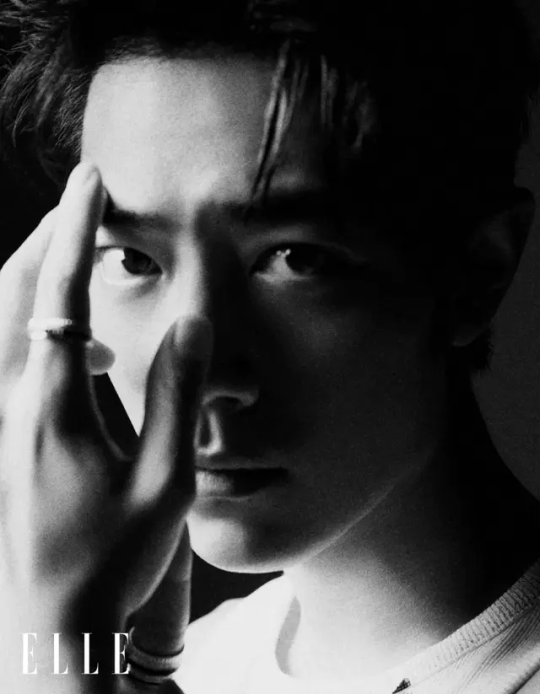
White Tie Printed Vest Balmain Quatre Double White Series Rings, Diamond Ring Quatre Black Series Rings, Diamond Ring All are Boucheron
Currently, in the dressing room after the shooting, Xiao Zhan was carrying his box of whole grain salad, vividly imitating the scene of meeting director Zheng Xiaolong.
“I was a little bit hesitant, so I asked the director if he wanted me to be thinner or stronger? He said, thin, of course thinner, so good looking, sharp.” After a while, Zheng Xiaolong saw him again while taking final costuming photographs, “He said, hey, you’ve done well.” From then till now, he has lost more than five kilograms.
Xiao Zhan, the source of all of this fission, was presentable and relaxed, to him the glamor seen by the outside world was a supplementary value. Sometimes he even forgot about it and said, “No one really cares about you.” Then he continued to talk about his work.
Recently completed was the 5-month filming of “The Legend of Zang Hai” in Hengdian. The previous film, also shot for 5 months, was the film “The Legend of the Condor Heroes: The Great Hero” directed by Tsui Hark. This was often the case for large-scale movies and long-running television dramas, it took four or five months once you joined the group. In 2022, his filming work was mainly “Where Dreams Begin / The Youth Memories” and “Sunshine By My Side”, in 2021 it was “The Longest Promise”, in 2020 it was “Ace Troops”, in 2019 it was “Douluo Continent” and “The Oath of Love”.
Endless filming appointments. Hence, it was sometimes impossible to decide whether the interval between filming should be lengthened or shortened.
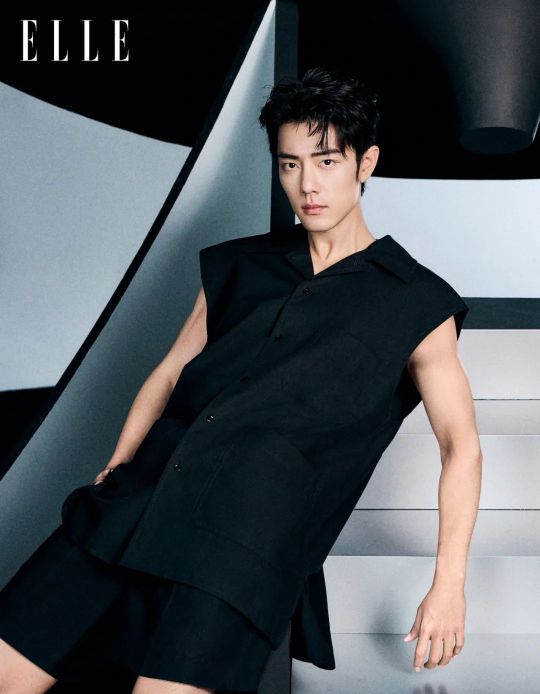
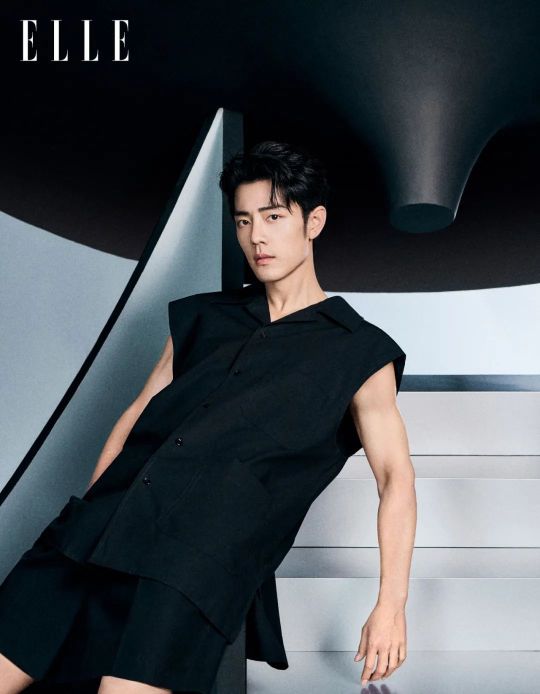
Black Sleeveless Vest, Black Shorts All are Gucci 2025 Spring/Summer Men’s Collection
In the second half of 2019, during the filming of “The Oath of Love”, Xiao Zhan was filming during the day and recording the variety show “Our Song” at night. Both sides were very challenging. The former was his first time playing the male lead in an urban drama, so he had little experience and was under great pressure; the difficulty of the latter lies in the harmonizing, “I had to memorize all the harmonizing that were different from the song’s tone, and not to be led astray. “
“Then, I thought it didn’t matter. I slept for an hour or two and woke up a good man again. But now, while my mind says it doesn’t matter, my body will make some protests.”
This year he was filming in Hengdian. Later, one day, he discovered that his tonsils were inflamed and it was painful to swallow, but he went to work as usual. Until the director came over and asked him, what happened to your eyes? Only then did he see his own swollen eyes in the mirror, held on until the afternoon, “completely like a frog.”
He had to go to the hospital, the symptoms themselves were very common and could be stopped by taking medicine. What can’t be done was exactly what doctors advised the most: you need to rest.
More importantly, “Perception will become dull. I am really afraid of this, afraid of becoming very mechanical and formulaic.” When saying this, the emphasis was on the word “really”. When he chatted with seniors, “They also said that you have to live life, you need to experience life.”
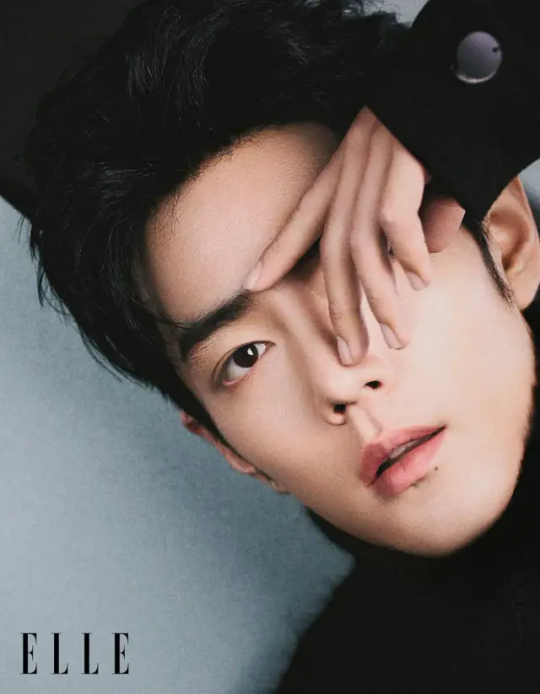
Black Sequined Shirt CFCL Black Knitted Turtleneck JIL SANDER
The fact is that the life in the limelight is somewhat contrary to the life of ordinary people, but the profession of an actor requires him to be in touch with as many folds of life as possible.
A while ago, he watched a one-man show on a variety show, describing the current workplace situation of contemporary young people. Xiao Zhan had opened a studio and worked before entering the entertainment industry. He could understand the gloom caused by going to work, but the new vocabulary and tools that appeared in the workplace made his sense of resonance weaken. He found himself gradually uncoupling to a certain extent.
#02 The flavor of life lies in the details
In early June, Xiao Zhan took a short vacation and returned to his hometown of Chongqing. He loved walking very much, and one night he walked for several hours, visiting old streets, People’s Liberation Monument, and even around the place where he used to work.
In 2014, the 23-year-old Xiao Zhan graduated from university and worked as a designer in a design studio. Every weekday morning, he transferred from Line 2 to Line 3 at Niujiaituo Station, pushing through the crowds and squeezing onto the light rail, and several times he had been squeezed so hard that his face was pressed against the glass windows.
He simply stuck against the glass and looked at the Jialing River below, seeing the strange rocks exposed in the dry season and various people, including winter swimmers, joggers and fishermen, with a rather optimistic spirit.
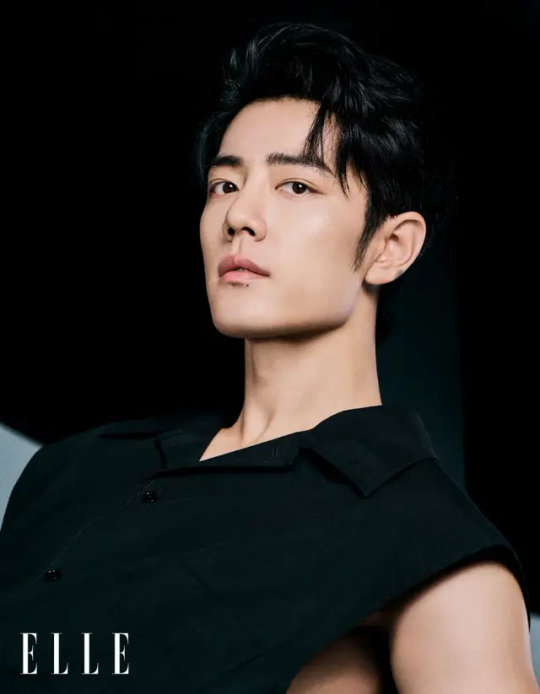
Black Sleeveless Vest Gucci 2025 Spring/Summer Men’s Collection
He still loved to observe the people around him——
“Why are you still here so late?”
“People walking in a hurry must be people who have just gotten off work and are rushing back, their behavior is just like when I was trying to catch the subway, when it’s the last train and you want to run, in a panic. Some food delivery guys are rush forward undauntedly. There are also some very leisurely people, sitting there drinking beer, then going home and starting a new day.”
“Everyone has an exciting story happening, and it is everyone’s life that makes up our society. So it is wondrous, everyone is the protagonist, we are all filming our own biographies, how will tomorrow’s story develop?”
At that moment, mixed in, he was like all those who have been busy working in a foreign land for a long time and finally had the time to go home, and discovered that “it had been a long time since I came here, and there had been quite a lot of changes.” “Actually, I’m not particularly happy or have any other feelings. I’m living, that’s all.”
Two and a half days later, Xiao Zhan left Chongqing and returned to Beijing due to work, then rushed to Shanghai, and then in turn to France. This time he brought his parents too. This was a long in coming family trip, within a week, they traveled from France to Switzerland and back to France. Every detail of the trip was magnified, they were happy, bickering, or just walking for a while, “it was all very vivid.”
On the day they parted, they had dinner at a restaurant in the south of France, the car to pick him up arrived and he had to leave first. Before leaving, his mother hugged him and told him to take care of himself. In a rare move, his father also hugged him awkwardly.
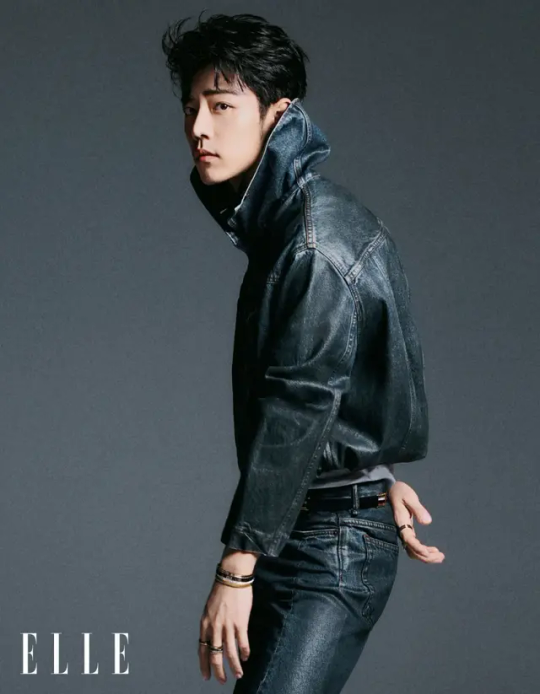
Retro Denim Jacket, Jeans All are Acne Studios Quatre Classique Series Necklace (as a belt) Quatre Classique Series Ring Quatre Classique Series Bracelet All are Boucheron
The flavor of life lies in the details.
“I used to think that work was everything and life was not that important, it was nothing more than having a place to sleep, then getting up, going to work, finishing work, and resting. But now, when my parents have grown older, and I have not been with them for a long time, you will feel as if each other’s lives, even your family’s, would become further and further apart. “He especially did not want this to happen.
The way to avoid suspension and regain the real sense of life is not difficult. “When you have time, go out and see more. The important thing is to feel life and feel the world. Even if some of the things are bad and cruel, they are all life, and will burst out with energy when you need it.”
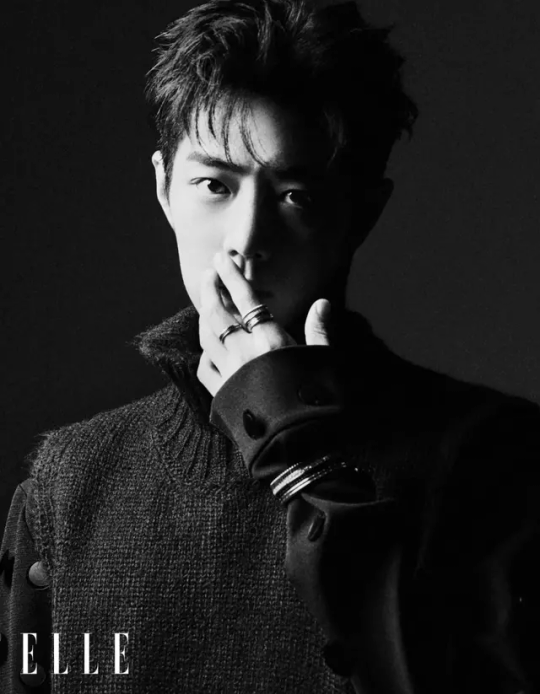
Black Sequined Shirt CFCL Black Knitted Turtleneck JIL SANDER Quatre Classique Series Ring Quatre Classique Series Bracelet All are Boucheron
#03 Stay innocent, stay complex
Halfway through the interview, Xiao Zhan suddenly said that he was ambivalent about long interviews. On the one hand, he was worried that he had not grown up enough and would show ignorance in the conversation, but on the other hand, he wanted to explore some subtle feelings through the conversation because he felt that he was not good at using words to record them.
Observation, feeling, understanding and expression are the essentials of why actors can bring creativity.
“Dialogue is also muscle memory.” Xiao Zhan said, “Although I am very introverted, I am not antisocial. Because I think actors need to learn to express, express your inner thoughts, and digest the content conveyed to you by the other party.”
Before the filming of “Sunshine By My Side” started, he met with the main creators and held several script meetings to deepen his understanding of one another and the characters. In the early stages of “The Legend of Zang Hai”, the producer also mentioned that he would discuss the script in detail and talk about a scene with a lot of his own understanding.
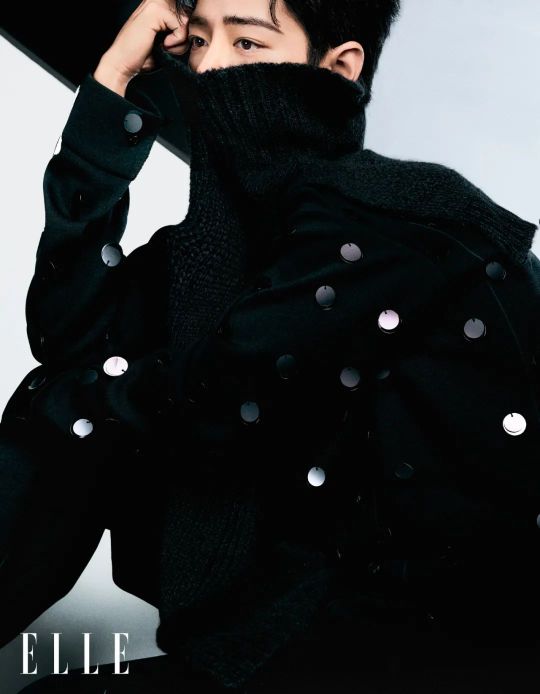
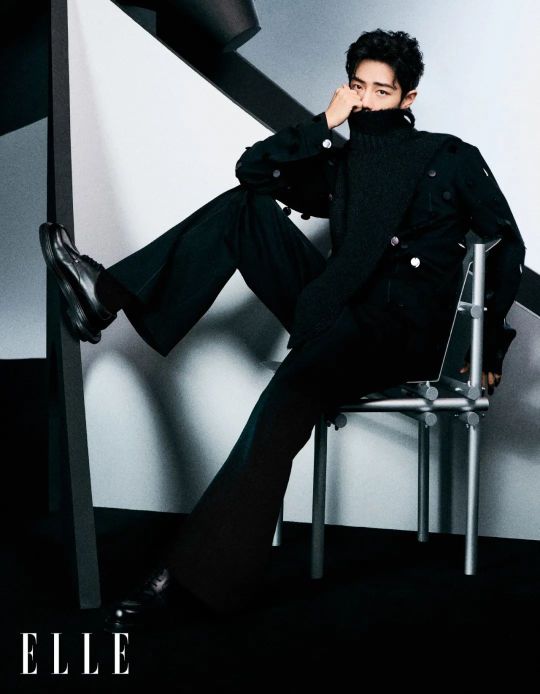
Black Sequined Shirt and Black Suit Pants are all CFCL Black Knitted Turtleneck JIL SANDER Black Lace-up Leather Shoes Sacai
Xiao Zhan is not an actor with a professional background, when he first entered the industry and filmed “Battle Through the Heavens” and “The Wolf”, he had strong doubts and asked himself, am I suitable? The constant negativity and self-refuting made him lose self-confidence.
Sometimes he would be asked what he would be doing now if he had not participated in the talent show, debuted, or entered the entertainment industry at the age of 23. He had thought about it, but did not look back.
If he was not good at acting, then he needed to spend extra time taking acting classes, review more in the monitors, and ask more advice from his seniors. He put his head down stubbornly, and with hard work, he slowly found the knack.
Later the filming of “Where Dreams Being / The Youth Memories” started, Xiao Zhan played Xiao Chunsheng, a young man from the military courtyard in Beijing, who was completely different from him, and even his accent was completely distinct. He felt insecure. Before filming started for many scenes, director Fu Ning would run over and whisper to him, “Don’t be afraid Zhanzhan, just speak bravely, if you feel it, just say it, the audience actually can feel your emotions and what you want to express.” .
He also gradually gained more self-awareness: “Techniques may not be my area of expertise, I rely more on feelings. Only when I feel it myself then I can have the confidence to interpret it. If I rely solely on some techniques, I don’t think it is sufficiently moving.”
It had been 8 years since Xiao Zhan first acted, and his resume included leading male roles in films and television dramas of various themes. But he still felt that he is a newcomer and hopes to cooperate with more experienced production teams if there is an opportunity in the future.
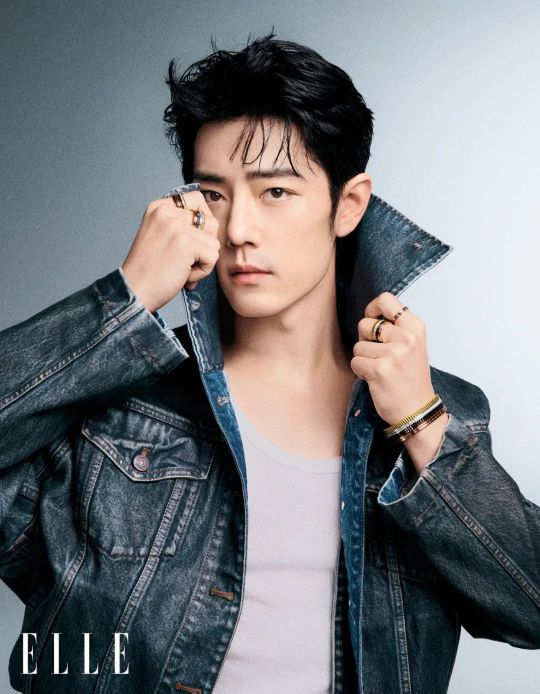

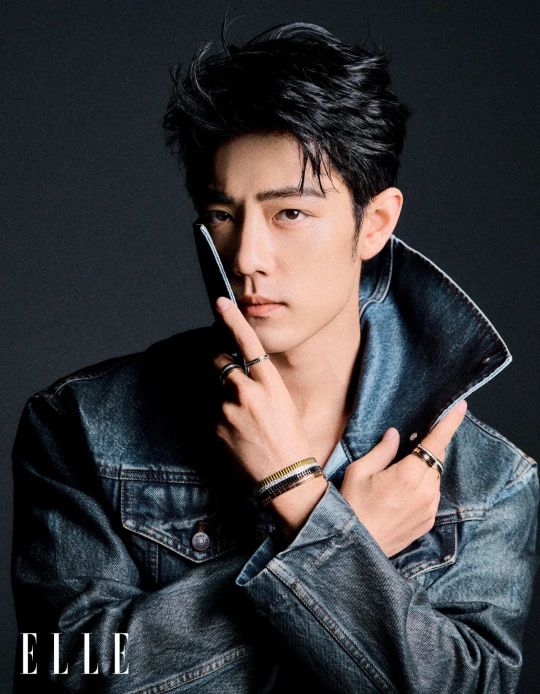
Retro Denim Jacket, Jeans All are Acne Studios Quatre Classique Series Necklace (as a belt) Quatre Classique Series Ring Quatre Classique Series Bracelet All are Boucheron
He would not think too much, he actually did not know his work plan divided by year. He only cared about the work arrangements for the next stage, rather than “asking about things that are too far away.”
“I still feel like a child now, but in fact I am not anymore. It seems like I am still in high school, but in fact I have grown up.” The nature of a child means curiosity, desire to explore, and power of imagination.
He placed the curiosity and desire to explore into his characters, “I mean, for myself, when I dig into the character’s background and past, I explore the complexity and contradiction of the character as a person, and present it. Only in this way can some of his choices and motivations be understood by the audience, and the work may then be good, and only then can you have the audience you have now, right?”
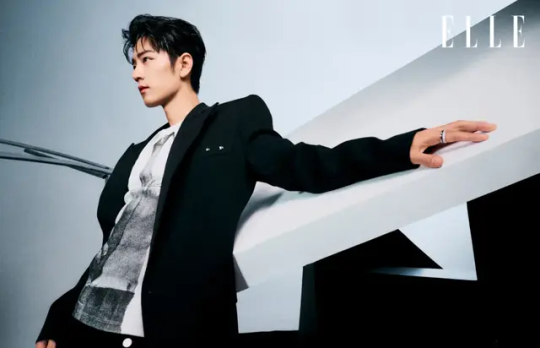
Black Suit Jacket, White Tie Printed Vest All are Balmain Black Suit Pants Courrèges Quatre Black Series Ear Clips (as brooch) Quatre Double White Series Rings, Diamond Ring Quatre Black Series Rings, Diamond Ring All are Boucheron
#(Q&A)
ELLE: During the break, will you think about anything on the set? Xiao Zhan: Of course, I remember that just a few days after filming was completed, I was still dreaming that I was still filming, and the director and I were still discussing how to say that phrase on set? How to handle that scene?
ELLE: Do you actually miss the atmosphere on the set? Xiao Zhan: I like it very much, because I like the feeling of everyone creating together and working together to get something done.
ELLE: When you first entered the entertainment industry and your popularity grew very quickly, you said you felt it was a bit unreal and magical, but now you seem to be quite relaxed. How did this change occur? Xiao Zhan: Rather than being unreal or magical, after so many years, I feel that I hadn’t had time to adapt to such a fast pace at that time, so when I woke up from sleep, I was like where am I today? What am I doing? I think it is a process, just like when you first enter the workplace, you will be very excited, “Work here I come, please take good care of me”, “My highness is here, everyone get out of the way”, “I can do it, I will do it”. (Laughs) But after experiencing a lot of things, you will feel that it seems that everything needs to be considered in the long term.

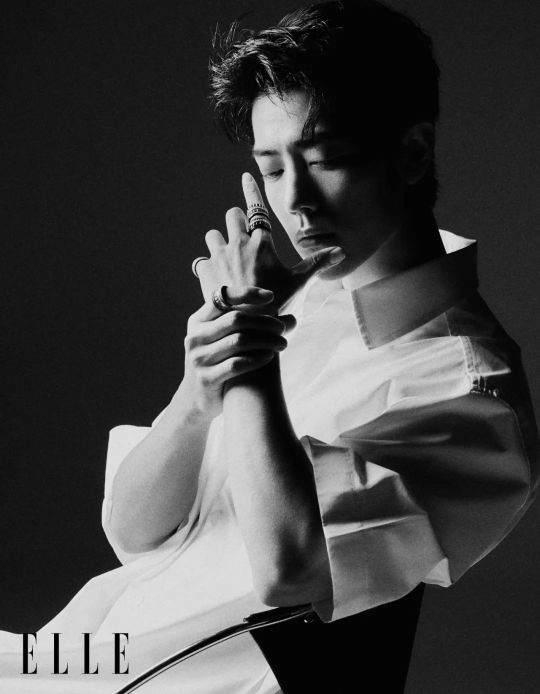
White Jumpsuit Gucci 2025 Spring/Summer Men’s Collection Quatre Jean Concept Ring Quatre Cofalit Concept Ring Puissance Quatre Concept Ring All are Boucheron
ELLE: In several interviews, you mentioned that you like to play roles that “can convey energy.” Why do you have such a preference? Xiao Zhan: Because I think this is the life of the character. The kind of energy I’m talking about is not just a single, generally understood positive energy, I’m talking about nourishment that can subtly influence and moisturize. I believe that every character has a complete storyline inside, this is what I like very much, and as long as you dig deep, you can move people. I don’t really like to call the villain a “villain”, as it seems to be a bad character from the beginning, but in fact it is not, he may have his own difficulties.
ELLE: It sounds like “transmitting energy” is just a general term, but is it actually about understanding different people through performance? Xiao Zhan: Yes, if you break it down to each character, what they convey is different. But if you want to talk about “good people” and “bad people”, then I don’t think it’s interesting.
ELLE: So do you think performance is a form of communication? Xiao Zhan: Yes, you can say that, I think it’s great to say that, (performance) is a bridge to communicate with the audience. Just like when a drama is broadcasting, I will read some of the audience’s comments and impressions after watching it, and I feel that they have a very rich feelings about the work. When I see some comments that are exactly the same as my thoughts during the filming, I will feel very amazed, as if the bridge is really connected, we don’t know each other in life and have never communicated with each other, but he suddenly understands my thoughts then, I’ll just feel that, oh, acting is a beautiful and magical thing.
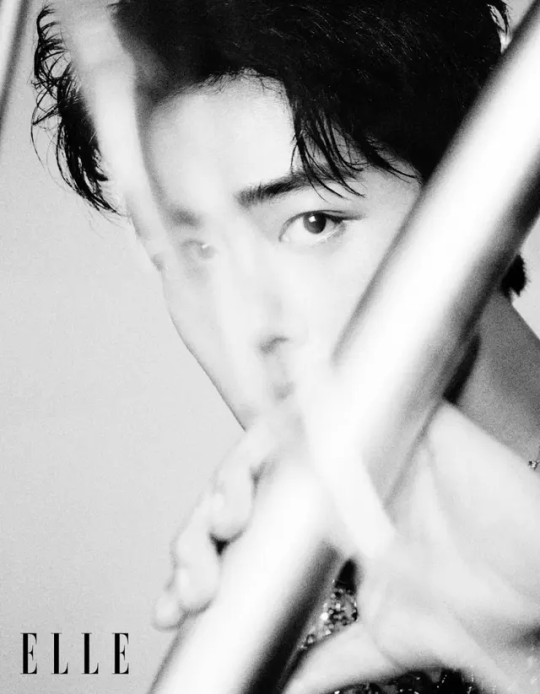
ELLE: Do you watch some science fiction movies, TV series, and literary works? Xiao Zhan: Yes, I used to like watching “The Three-Body Problem”, I have actually watched some science fiction movies recently, the American drama “Constellation”, and recently I am watching “Dark Matter”, which is about infinite flow and parallel time and space. Because I think maybe there really is a parallel time and space. Every choice you make will split out a different parallel time and space.
ELLE: Then will you imagine Xiao Zhan in parallel time and space? Xiao Zhan: I will really wonder, for example, is he still an actor? Maybe yes, but is he still filming now? Is he still singing now? Or is he also a designer? Is he an employee or is he his own boss? (Laughs) Really, I will.
ELLE: As for the future, what do you think it will be like? Xiao Zhan: Wow, I feel that the world may return to its original nature when the time comes instead, maybe the world will become a better place, and people will return to very essential communication.
ELLE: This is very interesting. Why do you think so? Xiao Zhan: Anyway, at least now I have a little aversion with this kind of ubiquitous Internet, when we were young, there were no mobile phones, everyone just chatted during meals, my friends would all come downstairs to play, hide and seek, and play various games, I feel that that time was very precious instead.
ELLE: Will there still be an actor career by then? Xiao Zhan: I think there will be. I believe that as long as life goes on, drama will continue. Because everyone needs an outlet, emotional resonance and sustenance, be it images or sounds. So I feel that even if the world is destroyed, as long as there are still people, drama will definitely exist.

youtube
66 notes
·
View notes
Text
Medieval Hermitage atop Katskhi Pillar, in Georgia (South Caucasus), c. 800-900 CE: this church was built during the Middle Ages, and it sits atop an enormous limestone column that has been venerated as a "Pillar of Life" for thousands of years

Known as Katskhi Pillar (or Katskhis Sveti), this giant block of limestone is located in western Georgia (the country, not the state), about 10km from the town of Chiatura.
The church that stands atop Katskhi Pillar was originally constructed during the 9th-10th centuries CE. It was long used as a hermitage for Stylites, who are sometimes referred to as "Pillar Saints" -- Christian ascetics who lived, prayed, and fasted atop pillars, often in total isolation, in an effort to bring themselves closer to God. The Stylite tradition originated in Syria during the 5th century CE, when a hermit known as Simeon the Elder purportedly climbed up onto a pillar and then stayed there for nearly 40 years, giving rise (no pun intended) to Christian Stylitism.
Stylitism managed to survive for about 1,000 years after its inception, but it began to die out during the late Middle Ages, and by the end of the 16th century, it had essentially gone extinct.

Researchers don't really know how the monks who built this Medieval church originally gained access to the top of Katskhi Pillar, or how they were able to transport their building materials up to the top of the column. Evidence suggests that there were still monks/Stylites living atop Katskhi Pillar up until the 1400s, but the site was abandoned shortly thereafter. Georgia fell under Ottoman rule during the same period, but it's unclear whether or not that may have played a role in the abandonment of the site.
The hermitage at the top of Katskhi Pillar lay abandoned for nearly 500 years after that; no one was able to reach the top of the pillar, and very little was known about the ruins that lay scattered at the top, as knowledge of the site's origin/history was gradually lost over time. There are many local legends that ultimately arose in order to fill in those blanks.
The abandoned hermitage was not visited again until July 29th, 1944, when a mountaineer finally ascended to the top of the column with a small team of researchers, and the group was able to perform the first archaeological survey of the ruins. They found that the structure included three hermit cells, a chapel, a wine cellar, and a small crypt; within the crypt lay a single set of human remains, likely belonging to one of the monks who had inhabited the site during the Middle Ages.
A metal ladder (the "stairway to Heaven") was ultimately installed into the side of the pillar in order to make it easier for both researchers and tourists to gain access to the ruins.

The hermitage at the top of Katskhi Pillar actually became active again in the early 1990's, when a small group of monks attempted to revive the Stylite tradition. A Georgian Orthodox monk named Maxime Qavtaradze then lived alone at the top of Katskhi Pillar for almost 20 years, beginning in 1995 and ending with his death in 2014. He is now buried at the base of the pillar.
The hermitage is no longer accessible to the public, and it's currently uninhabited, but it is still visited by local monks, who regularly climb up to the church at the top of the pillar in order to pray. There is also an active monastery complex at the base of the pillar, where a temple known as the Church of the Simeon Stylites is located.

The Church of the Simeon Stylites: this church is located within an active monastery complex that has been built at the base of the pillar; several frescoes and religious icons decorate the walls of the church, and a small shrine containing a 6th century cross is located in the center
There are many lingering questions about the history of Katskhi Pillar, particularly during the pre-Christian era. There is at least some evidence suggesting that it was once the site of votive offerings to pagan deities, as a series of pre-Christian idols have been found buried in the areas that surround the pillar. According to local tradition, the pillar itself was once venerated by the pagan societies that inhabited the area, but it's difficult to determine whether or not those claims may simply be part of the mythos that surrounds Katskhi Pillar, particularly given its mysterious reputation.

Sources & More Info:
BBC: Georgia's Daring, Death-Defying Pilgrimage
CNN: Katskhi Pillar, the Extraordinary Church where Daring Monks Climb Closer to God
Radio Free Europe: Georgian Monk Renews Tradition, Lives Atop Pillar
Architecture and Asceticism (Ch. 4): Stylitism as a Cultural Trend Between Syria and Georgia
Research Publication from the Georgian National Museum: Katskhi Pillar
Journal of Nomads: Katskhi Pillar, the Most Incredible Cliff Church in the World
Georgian Journal: Georgia's Katskhi Pillar Among World's 20 Wonderfully Serene and Secluded Places
#archaeology#history#anthropology#artifacts#medieval architecture#medieval church#Stylites#asceticism#georgia#sakartvelo#katskhi pillar#religion#travel#monastery#paganism#caucasus#christianity#strange places#ruins#medieval europe#weird history#georgia my beloved#sakartvelo my love
564 notes
·
View notes
Text
PART 6
part 01 02 03 04 05 06 07 08 09 10
Waking up to the sound of Hyrule screaming was in Legend’s top ten worst ways to wake up.
He was on his feet with his sword out before he even realized he was awake. Adrenaline shot through his body, his eyes darting around, ready to take down whatever it was that dared to make Hyrule sound like that.
Not Hyrule. Not. Hyrule. Over my dead body!
But, there weren’t hordes of monsters tearing his brother apart, they hadn’t come for their sacrifice, a nightmare that was added to Legend’s amazing sleep rotation of bedtime horrors ever since Hyrule told them the truth about why the monsters were after him.
No monsters, but there was blue light washing out the camp, magic pulsing through the ground and up the trees and thrumming through their bodies. At its epicenter was Hyrule, screaming incoherently as he was bent over Wild— No... Wild’s body.
The magic was making it hard to get enough air into his lungs, Legend’s inhale stuck in his throat, it was that overwhelming.
The first time Legend felt Hyrule’s magic, he knew it was powerful no matter how the kid tried to hide it. Magic as high quality as that was like molten lava, liquid gold, heavy and thick. It was like tasting a well seasoned stew full of potatoes and meat after having gruel all your life. That sort of magic had layers of spark and sensations you’ve never even thought of before let alone can comprehend. So only using “a little smidge” Hyrule had said while keeping his finger and thumb that exact smidge away from touching, wasn’t going to do anything to convince anybody.
That “little smidge” was enough for his magic sword to shoot out enough fire to take down five bokoblins at once.
The more time that passes, the more he’s noticed beyond the power. Like how gentle it can be, how easily excitable it is, and playful. Young and curious. But this was exactly why it was so dangerous.
It was reacting oddly with the magic of Wild’s era. Largely something that comes directly from nature— from wolf cubs play fighting in their warm cave, the way fruit glistens with dew in the early morning, and the flow and shimmer of water— was curiously reaching out to Hyrule’s fairy chime and glow, giggles in thick, neverending fog, crossing a line into a whole new world or over a dangerous boundary that should have been respected— finding a friend so alike them but so much more unnerving.
Nayru, it was like seeing Hyrule and Wild hit it off a bit too well all over again.
The trees were growing upwards right in front of their eyes, the air sparking with fae magic, the undergrowth bustling over their ankles, all glowing and pulsing blue.
…This was too much magic all at once.
The fear of the realization had Legend snapping out of his awe and running to Hyrule, forcing him, kicking and screaming, away from the body, the magic cut off and its force abated for breathing to get easier, for the trees and plants to shrink back to their peaceful, and original size.
As he struggled, Hyrule’s voice was layered with dizzying intensity and his body was almost too hot to the touch, but he was aware enough to recognize Legend and refrain from using charmspeak.
But not aware enough to realize the amount of magic he was spending, how dangerous it could’ve gotten. Not aware enough to realize that it was all going to waste.
“HE’S DEAD!” Legend had yelled over Hyrule’s voice, the words booming out over their camp just as powerful as Hyrule’s magic had been and finally getting through to his brother who froze in his arms.
When Hyrule suddenly lost all strength, Legend had to carefully guide him down to the ground, holding him as he shook.
The tears soaked into his tunic. Legend never wanted to hear Hyrule cry like that again.
Calming Hyrule down took until just before Four and Wind returned from washing.
Legend immediately zeroed in on Wind’s swollen, red eyes before his gaze flickered down to how Four was holding his hand, and his need to do something about it was satiated by Warriors pulling both of them in for a hug.
He couldn’t get used to someone else stepping in when he couldn’t, but… well, he’d enjoy it while he had it.
Warriors looked over at them, looking like a cucco with two chicks under his blue wings. “Is he okay? That was an impressive show of magic. Probably wore him down.”
Legend looked down at where Hyrule was shivering in his arms. The mass of fluffy, brown hair the only thing he could see properly when the kid had his face hidden against Legend’s shirt.
“I have him,” he reassured. Slowly pulling away from the hug but leaving his hands on Hyrule’s shoulders, he revealed a glistening face of tears and a tired, defeated glaze of the eyes. Hygiene might not solve anything, but it was something to do. “Come on, our turn.”
Hyrule was limp and wobbly, dizzy from the amount of magic he’d used in such a short time and the crying he’d done, but he’d be fine after having some sugar. Legend always had a bag of honey candy on him for this exact situation. Wild knows he never ate any of it. He’d have such a shit-eating, knowing grin every time he handed Legend his refill that Legend had no choice but to slap him on the arm before snatching the bag out of his hand, forced to hear the kid’s cackling as he stomped away.
His mouth twisted as he caught himself in those memories. They had reached the water and he helped Hyrule down beside the bank.
He would run out of honey candies eventually, and he’ll have to start buying something else to keep in case Hyrule needed it.
“Wash up,” Legend said, rolling up his sleeves and taking off his hat.
Hyrule took a deep breath, still pretty out of it, but he bent over and started to wash his face with shaky hands.
Silently, they washed their face and hair, and brushed their teeth. A more thorough clean would have to wait but Legend took the chance to use a rag to wipe off some of the sweat and grime on his upper body. As they went through the task, Hyrule’s body stopped shaking and more strength and coordination came back to him, fully oriented and awake.
After pulling his shirt back on and toweling his hair dry, Legend pulled out one of the honey candies.
“Here.”
Hyrule’s face lit up at the sight of the candy, then fell just as abruptly. He held out a hand for Legend to place it on, and didn’t eat it right away, but stared at it there in his palm.
“Eat it before a bug lands on it or a bird snatches it away,” Legend said, hating that expression. “It’s not like that’s the last piece of candy ever. There’s plenty more where that came from.”
His words somehow drew Hyrule’s eyes down to where Wild’s slate was hanging from his belt. Anger took hold of him, and he threw Legend the dirtiest look he’d ever gotten.
That wasn’t what he had been implying. But he couldn’t say Hyrule was entirely wrong since, once he was reminded of its existence, he felt a small relief that maybe there were hundreds of honey candy waiting for them in the slate. Something in his chest that Legend would deny up and down from Hyrule to Lorule was soft and longing, aching with grief, was soothed at the thought that maybe they could still have this part of Wild for a little while longer.
Popping the candy in his mouth, Hyrule moved to stand up. Habitually, Legend went to help him, but Hyrule leaned out of his reach.
“I’ll walk on my own.”
Legend rolled his eyes, but refrained from saying anything like a mature hylian. Fine, if Hyrule wanted to wobble like a newborn, freckly fawn back to camp then far be it for him to interfere.
Hyrule wobbled ahead of him by only two paces because, “you never leave your wash buddy behind,” Warriors had told them sternly awhile back. Always within earshot, within sight, within grabbing distance.
Hyrule was terrifying when he was angry. Legend secretly thought the Traveler and the sleepyhead were the scariest of them all. Sky is a manipulative bastard, Legend won’t be fooled, and you never want to be on the other end of Hyrule’s piercing glare. This was the first time in a while that Legend has been the object of Hyrule’s wrath, having managed to avoid scraps for the past couple of weeks. He’d seen the way the air around Hyrule had been vibrating with his magic and pitied any yiga who dared to cross the fae’s path. He’d seen the way that magic sparked and hissed when he’d first brought up his idea.
Even despite that terrifying anger, the kid stuck by him, the pushover.
They walked into camp separately. Hyrule was quick to go further than those two paces and made a point of busying himself by rolling up both of their bedrolls and doing anything but looking at Legend.
Legend could take a hint. He looked around the camp to find something to do (firmly avoiding looking at where a wolf was laying) and latched onto Sky who hadn’t moved from his spot under a tree.
“Hey, birdbrain,” he marched over before standing over the man with his hands on his hips, “how did you sleep? And don’t bullshit me.”
A small smile twitched onto Sky’s face. Legend thought the endeared slant to his eyes was entirely too much this early in the morning. “Not well.”
Legend huffed in dissatisfaction. “Go to the stream with Warriors.”
Sky hummed his agreement and heaved himself up before walking over to separate the Captain from his hugging companions.
That taken care of, Legend went over to where the cooking pot was waiting with the leftover rice from yesterday. He lifted the top off to peer down at the cold, miserable sludge. The slate hung at his belt and rested on his thigh as he crouched there.
He needed to be quick or else Wild would notice and smack him with a utensil that shouldn’t smart as much as it did, turning his displeased eyebrows onto him, demanding he take his grubby hands off, that it was his job to cook. Legend would throw a few jibes back and he’d be chased off by the cook waving the spoon Sky had carved for him around threateningly.
The anticipation of all of it, of what had become Legend’s ordinary, thrummed through his body. Any minute now… he’d be caught and the moments that followed like a beloved script would fall into place.
Seconds passed with him still crouching next to the pot, staring at the rice they had ruined by adding too much water the night before, and they would continue to pass no matter how long he waited. Normal had changed without his permission once more.
Crouching there, watching the rice slide down the side of the pot, the slate resting on his thigh felt like a hot brand.
The slate was important to Wild. Legend knew this when he saw the kid lose it in battle, how his eyes searched for where it fell despite how the distraction was earning him close swipes from swords and sickles. He knew this when he picked it up right after the Yiga vanished with his brother. He knew when he planned to keep it safe until he could return it.
If he couldn’t return it (to see Wild relax in relief and smile at him in gratitude, to lecture Wild about relying too much on the slate, to ruffle his too long hair until it was tangled and mussed) then he was going to put it to good use no matter how much Hyrule glared at him.
He couldn’t wait to get rid of it. He wasn’t supposed to have had it for this long.
Legend blinked, exhaled, and started to move again. He grabbed the ladle.
…He could make an edible gruel.
First | Previous | Next
@homewardwander @gothroughthelookingglass
(it's only been less than a day since they found Wild btw)
#linkeduniverse#linked universe#lu#lu fic#lu fanfiction#lu legend#lu hyrule#linked universe legend#linked universe hyrule#spookswrites#downfall duo#Please Perennial
51 notes
·
View notes
Text
Hallelujah
(There are no Veilguard spoilers in this content, it was all created in early September, I’m only posting it now).
So I found this old Bioware article from 2014…
Its about what the writers listened to when they wrote their characters.
I was immediately struck by Weekes’ (writer of Bull, Cole, & Solas) comment that he wrote whole swaths of Solas dialogue listening to K.D. Langs cover of Hallelujah.
Because when I was playing Origins, way back in 2009, as soon as I heard the words “The Chant of Andraste” I thought of Hallelujah.
No better parallel could exist for me. Hallelujah, if you listen to the lyrics, is not really church related, yet it got absorbed into the church as a hymn. Its fucking sad, and yet we’re praising god or some shit?
Kinda like how I feel The Chantry has changed their religion, their original purpose, Andraste and the Maker and all that, into something horrible (subjugation/lobotomization of mages, feeding templars crack, you know, nOrMal StUfF).
I love the parallels there. And I love that Weekes used this sad-ass fucking dirge for our sad-ass fucking egg, especially considering what KD Lang said about it:
Canadian singer k.d. lang said in an interview shortly after Cohen's death that she considered the song to be about "the struggle between having human desire and searching for spiritual wisdom. It's being caught between those two places." (Be still, my heart.)
And I thought about how Legends Shouldn’t Be Given The Weight of History, and how The Chantry’s purpose has been twisted, and how Hallelujah’s purpose has been twisted, and at the time, I was completing The Temple of the Emerald Knights in DA:I. I was thinking about how the Elvhen temple is littered with statues of Andraste and Mythal (dragon), how there’s a Knight, Andale (which is so obviously Andraste, prob Flemythal reincarnate of some sort).
The blending and melding and mushing of cultures and religions as time drags on, how originally good or pure purposes are changed or shifted, or corrupted.
And I thought of Andraste again.
I have been unhealthily obsessed with this artist named Aly, who is a Bard in Thedas and sings at The Dread Halla Tavern (you can find them on spotify here);
(for clarification, this human is not me, I am not a singer, she is very good, you should go listen to all her songs-after you read this).
Anyways, I got to thinking…
What would Andraste’s Hallelujah sound like?
I had to write it.
Its sad and beautiful and tells the story of a woman flighting against forces she has no hope of defeating (But we still have to try).
[Andraste’s Lament]
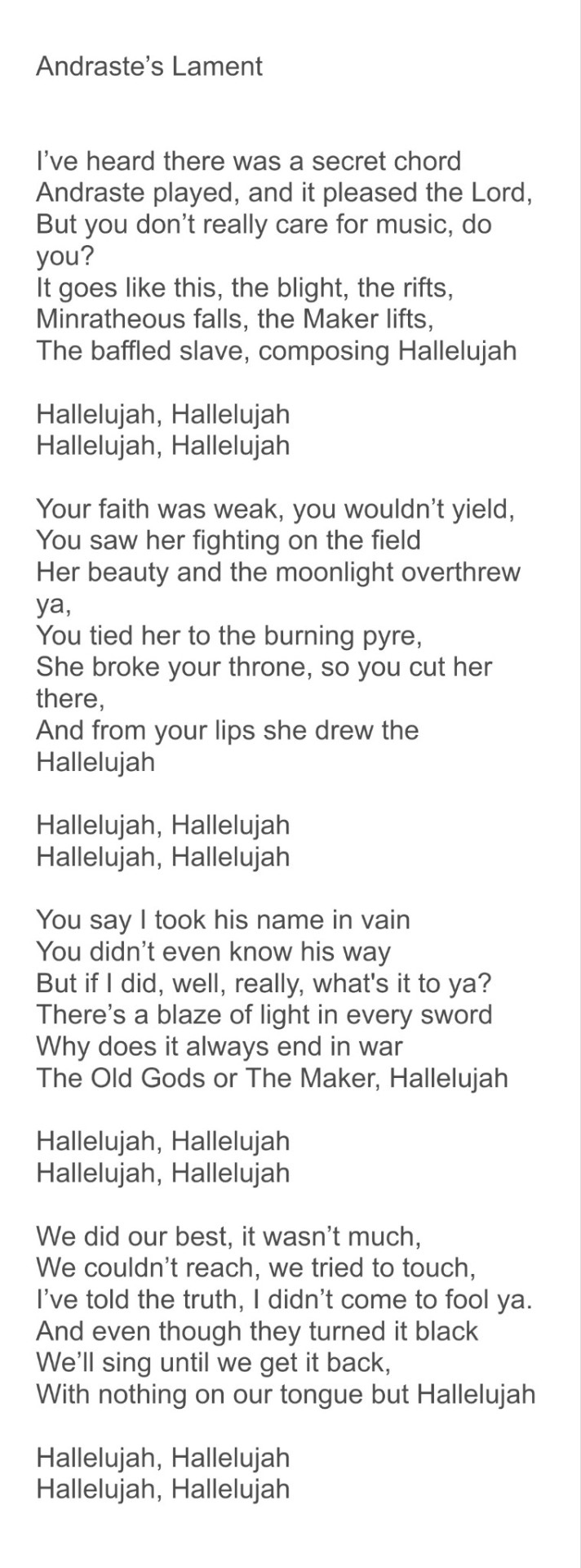
And I got immediately transported to a smoky, dimly lit tavern in Southern Thedas. Aly has just sung Andraste’s Lament, and is approached by Neria, a lone Dalish Elf who clutches a scrap of paper tightly in her hand.
Aly listens to this elf tell her a story of a sad song her mother used to sing her when she was young, before she got killed by bandits. And could she sing this song for her, please, she even has a few coppers.
And Aly sits down, scans the paper, and realizes it’s a different version of Andraste’s Hallelujah.
Written in small looping script at the top, in Common, is Dirge of the Dread Wolf.
And she sings it softly to Neria, a strange story of mothers and gods and tricksters and wolves, and Neria’s eyes well.
[Dirge of the Dread Wolf]
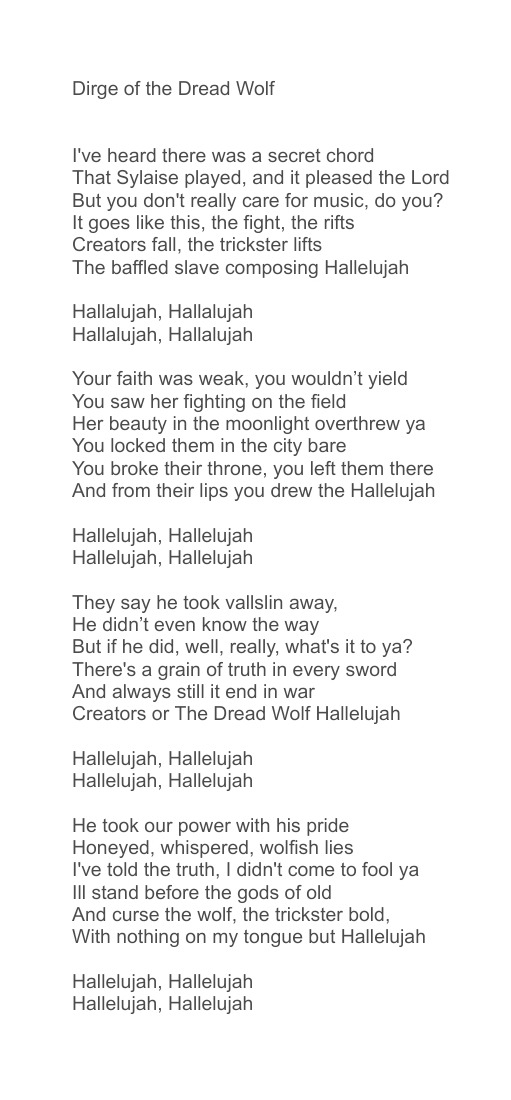
She ends the song, the last beautiful Hallelujah trembling through the thickness of the tavern air.
Neria sniffs once, and then begins a new story. Aly listens to this Elf speak of a crumbling Dalish temple deep in the middle of nowhere, where she found a piece of paper beside a four legged statue that has since eroded to expressionless guardianship, of words crossed out and changed and smudged.
Then she shakily hands Aly a different piece of paper.
This velumm is significantly older than the first, thicker, almost crumbling around the edges.
And its Hallelujah again, but its spelled wrong, and some strange name with too many n’s in it is written at the top.
And Neria asks Aly if she can sing this.
But it’s written in Elvhen, and Aly shakes her head, she doesn’t think she can stumble through all the strange Dalish a’s and ash’s and am’s (there's so many damn vowels in Dalish…).
But, Aly halts the elfs falling face, she is more than willing to sing this in Common, if Neria will stay to act as translator.
So the two bend their heads close over the bar, and Aly pulls out her small precious notebook where she writes down the lyrics to her own tunes, and they quickly make work of the Elvhen words, Aly humming and hawing as she changes some words to better match the pattern of the song.
And soon they have a brand-new Hallelujah, and Aly asks Neria to pronounce the name at the top.
Ghil-an’nain, Neria says, and make sure you spell the hallelujah right.
H, a, l, l, a, l, i, e, u, y, a.
What does that mean in Dalish? Aly asks the elf.
And Neria shrugs. Halla is like a halla, she assumes. But this word lieu, she doesn’t know.
Aly assumes in the context of this song it must mean birth, but Neria shakes her head. Shena is the verb for born.
Well, what about victory? But Neria shakes her head again. Ena’sal’in is the word for victory, or triumph.
Aly blows out a breath. She’s a lyricist. What would make this poetic.
What about truth?
The elf thinks, and a small smile grows on her lips.
She can’t think of a Dalish word for truth.
Ghilan’nain’s Truth of the Halla?
Aly’s beautiful soprano soon fills the room, and her eyes widen when a soft Alto joins her, singing along in the original Elvhen.
[Ghilan’nain’s Truth of the Halla]
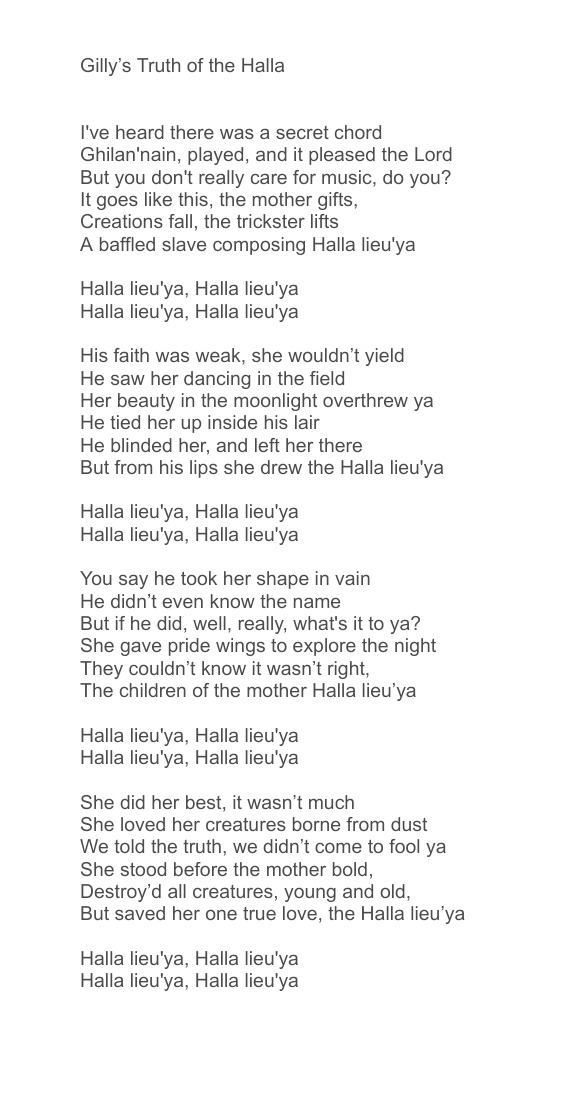
A haunting melody, completely changed by the understanding of the root of halla lieu’ya, not a praise to The Maker, or the curse of a trickster, but the story of a young god, beaten and battered and blinded, and her creations, and her destruction of them.
[Ghilan’nan’es Halla’lieu’ya]
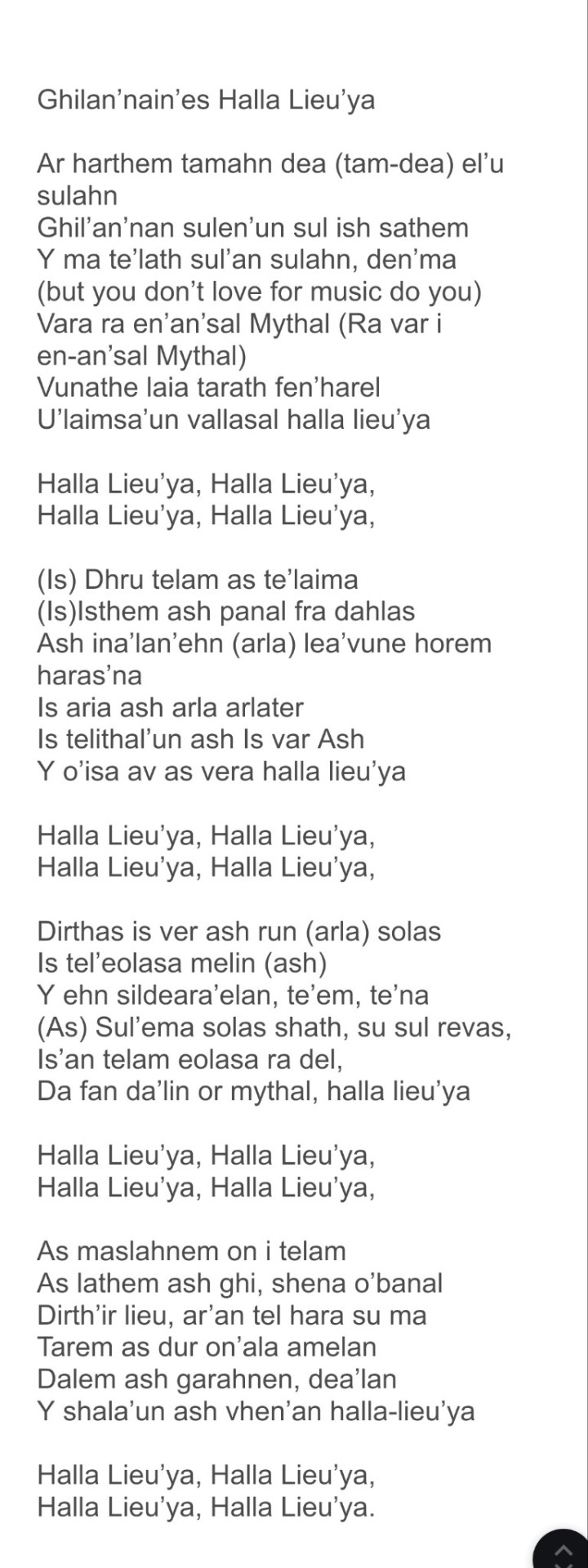
The tavern erupts when they finish, and poor Neria blushes furiously as her back is slapped, and her hair is tousled, by the patrons of the establishment.
Aly and her new friend make their way to the bar, where foaming tankards await them.
They cheers, and as they tip the beer back, a city elf approaches them, dressed like a Dalish, but he has no vallaslin. He pushes his cowl down to reveal a bald head and shocking purple eyes. His voice is quiet, with a deep, romantic lilt.
“Where did you find that song?”
…
Please be gentle with any constructive criticism on my voice, I am absolutely NOT a singer, I know I don’t have a superstar voice but I’m also not tone deaf, so just… don’t be shitty to me, internet. Listen to the lyrics, not the delivery.
If anyone’s actually interested, I'll message you the lyrics. I also did record all four songs (Andraste, Dread Wolf, Ghilly (English), and Ghilly (Elvhen),) but can only put one video per post. Maybe I'll link them later if people are interested.
*It did not even occur to me until after writing Andraste’s Hallalujah that someone might have had this idea already. I did a little googling afterwards, and someone has put solas’ dialogue to the tune of Hallalujah, but no ones “re-written” it yet in this context (that I could find). My query to you is, why would Solas speak in Leonard Cohen's hallelujah/iambic pentameter if he had never heard it before?
---
Obviously, this can never be turned into a real song, because Sony owns the rights to the OG Leonard Cohen’s Hallelujah. But the romanticism of this song, changing through the ages, was too good to pass up. I hope you enjoy it, sincerely, and if you are a better singer than I, by all means, use my lyrics and record it, and please send me the link so that I can listen to it!
Thanks to Weekes, Leonard Cohen, & The Dread Halla Tavern for inspiring this.
Bare your blade, and raise it high.
#Dragon Age#Dragon Age Homemade Lore#Not Cannon#or is it#NO DA4 spoilers#lyrics#The Dread Halla Tavern#Halla lieu'ya#hallelujah#A Song for Trick#Trick Weekes#Solas#The Dread Wolf#Ghilly#ghilan'nain#Halla#Andraste#Andraste's Lament#Dirge of the Dread Wolf#Ghilan'nain'es Halla Lieu'ya#Ghillys Truth of the Halla#Dragon Age Inquisition#Do not give legends the weight of history#Toss a coin to your Inky#Toss a coin to your rook#long post#if youre still here what are you doing here. go. shoo.
29 notes
·
View notes
Text
Got tagged by @amelias-hart. Thank you!
1. How many works on AO3? 42. I never noticed it was that many until I looked to answer this lol.
2. Total AO3 word count? 580,697. There’s more to come from fanfiction, I’m nowhere near done importing everything from there.
3. Top 5 fics by kudos:
Worth the Spotlight
Dreams
MY Ladybug
Interrupted
Hero
4. What fandoms do you write for? I’ve written for Miraculous: Tales of Ladybug and Cat Noir, G.I. Joe, and Legend of Zelda. I might eventually try and write a bit of a closure for the Arashikage verse in G.I. Joe, and there’s still this Fantômette crossover kicking around in my head for Ladybug, but I pretty much only write for Zelda currently.
5. Do you respond to comments? Always! And usually pretty quickly, I love the feedback and I love talking to readers.
6. Fic with the angsty ending? Actually a tricky one. I think for angsty ending in particular, it would be a toss up between "No More. Not One Single Time More" and "Forever Friends". I’ve written plenty of dark stuff, but for the most part, I aim for hopeful ending. Those two had, respectively, an ending that confirmed the price that was paid and an ending that just promised one fairy would continue to try making eternity just a bit less terrible for her friend.
7. Fic with the happiest ending? Also tricky. I think many of them have happy (o at least happy-ish) ending, but the ones that are more straight up happy and resolved as opposed to hopeful things are heading in the right direction would be Letters and Interrupted. Fluffy mushy lovey dovey happy endings.
8. Do you get hate? A tiny bit on fanfiction with ATHU, none so far on AO3. I’ve gotten lots of concrit, but hardly ever any hate.
9. Do you write smut? I have occasionally, and one of my upcoming stories will probably have some (for character development).
10. Do you write crossovers? Sometimes, but not usually franchise so much as doing crossovers with some friends’ works. Mixing AUs type thing. I love doing that!
11. Ever had a fic stolen? Not the whole thing. I had a scene stolen, I had head canons borrowed with credit given to someone else, and I STILL think Barbie: Princess Charmed School MIGHT have stolen the ending line of Arashikage. Because in the movie, the same line made NO SENSE. Literally, the next line was another character going “WUT”. And I have yet to see it or a variation of it anywhere else so it's not like it's just one of those things that come to everyone. *clears throat* Sorry. Deactivating conspiracy theorist mode now.
12. Ever had a fic translated? No. Someone requested once but I asked them not to. I’m not comfortable with not knowing what has my name on it, so for any language I can’t speak, I don’t really want translations from people I don’t know. I did write one story both in French in English, but the French version barely got any readers, wasn’t worth the effort in the end to do it again.
13. Have you ever co-written a fic? Not really. We talked out some ideas a fair bit back in the days, but the closest I got to a collab was writing a story with the same idea as another writer, by common agreement. Hers ended up being set later and they almost read like a prequel-sequel, but that wasn’t actually planned.
14. All time favorite ship? Not much into romance. I tend to favor the obvious ones like Zelink and I still have half a mind to write a Candy Candy story where she reunites with my personal favorite love interest (Candy/Terry forever!).
5. WIP you want to finish but doubt you ever will? Arashikage sequel, and my original story.
16. Writing strengths? I… I hope I have some lol. I’ve been complimented on believable feelings and reactions from characters, and I’m sort of proud of my plots?
17. Writing weaknesses? Descriptions. You’re going to have to assume people are wearing clothes, guys (unless they’ve taken them off). And also that there is some kind of landscape or something around them. I often neglect to describe things unless they affect the plot or the scene.
18. Thoughts of mixed language dialogue? I avoid it in my own writing. If a character is bilingual and they switch language, I’ll paraphrase a translation if the other speaker understands it and indicate something like “they said something in (language) next, that nobody around had any hope of understanding”.
19. First fandom you wrote for? 80s ninja movies when I was 12. It was… graphic. Years later, Sailor Moon. I’m not sure I actually posted any of it.
20. Favorite Fic you’ve ever written? I honestly don’t know. I’m still very proud of Arashikage and Hero, but I have some one-shots that I think are very good too.
Open tag to anyone who'd like to do this!
10 notes
·
View notes
Text
The "distant oasis"
Location: an unnamed, red desert
Memory image source:
@MissLavenderYT
YouTube Link
Details:
The "distant oasis" is a remote location mentioned in Sylus' "Lost Oasis" memory story. This oasis can be found in a red desert and features the remnants of man-made structures. Along the road, rows of two-story bungalows painted in red are scattered among palm trees. At the end of this road is a plaza. To get to the distant oasis from Linkon City, the protagonist required a "long-haul flight with several layovers".
Climate:
When the protagonist exits the airport, she mentions feeling "a humid, warm, yet gentle breeze". But at night, the desert's wind is cold. The air carries notes of the strong smell of local spices and the sweet fragrance of palm trees.
Floral and Fauna:
This distant oasis features wild sea buckthorn (top left), tamarisks (top right), and palm trees (bottom). According to Sylus, not many Wanderers show up here.

Geography:
As they drive away from the airport, they mention driving under "the palm trees' expansive canopy".
In this red desert, beyond a vast sea of palm trees, is a place called the Valley of Lost Souls.
Culture:
Language:
While there, the protagonist mentions a language barrier because she doesn't speak the local's language.
Customs and Traditions:
It is their custom to keep the things that have killed their people as a reminder not to be killed by the same thing again. At night, the plaza's bonfire is lit, and the protagonist mentions hearing the ancient sound of handbells as the elderly chant in the plaza. Once the bonfire goes out, the bells and chanting fade away.
Legends and Myths:
The local myths say that their seven gods had originally occupied these lands. In that time, the people had lived and relied on their divine blessings. But these gods were capricious. When one of the people discovered that these so-called blessings were paid with human lives, he invited the gods into this valley. When they arrived in the valley, the seven gods were killed by their own ancestors when this person cut off their heads and buried them in the valley. As a consequence, the people were either exiled from the Valley of Lost Souls or simply chose to abandon the gods themselves.
Other:
While there, Sylus purchases a classic/vintage motorcycle. He says that it's a model for locals and is only a few years older than the protagonist.
Locations:
An airport (top left): Though the airport is not directly shown, we can see the edge of a sign that points toward its location. Based on its appearance, the protagonist guessed it was originally an old air base.
Plaza and bungalows (top right): Rows of two-story, red painted bungalows are placed along the road. At the end of the road is a palm tree-shaded plaza that features a bonfire. Though the story specifies that the bungalows are painted red, the depiction we are shown has bungalows of an off-white/tan color. The "elderly woman" has a bungalow with a rooftop terrace (bottom left, bottom right).




A hotel: Sylus briefly mentions having made a hotel reservation for the protagonist. But this hotel is never depicted

#love and deepspace#lads#love and deepspace locations#lads locations#lads unknown locations#love and deepspace unknown locations#lads distant oasis#love and deepspace distant oasis
14 notes
·
View notes
Text



Haven't done one of these in at least a year, but...
New milestone achieved for Eternally Never Yours! The joy in seeing a new 100 checkpoint passed is always a nice one.
We're doing extra numbers going past 1000 now too, whoo!
As stated before, this isn't really significant in the Super Mario AO3 lists anymore, like not even remotely. But, I think it's ok to celebrate small stuff like this still.
After all, it's a story that's reached so many different readers, and can still maybe connect with more in the future. Plus, like, it's fun to see the progress over time. (True to the content itself lol.)
Thank you all once again for reading!! It's such a delight to write a fun Mario fanfic and hopefully a great gay story too. (Seems to be true on the reading end for a good number of folks, at least, haha!)
But, I am always grateful that this story is found endearing enough for a lot of readers out there, and it wouldn't stand at all without you. I wish I could do more, but my talents are limited and the Internet makes it difficult too, so, my thanks to you will have to do.
BUT ALSO!
Please support the artists that have created fan art for the story as well! They make great content in and outside of the Mario fandom, on top of unique artworks too.
You can find each of them in the 1k post above or right here since scrolling back up can be a pain when we're not feeling it. (Know what we are feeling? Those adorable Bowser/Mario smooches! ...Well, like, in our hearts, right? ...You are here for a reason, you know.)
Anyway, thank you so much for the continued support! Hope to see you continue to check in on the story, and hopefully we'll see more readers join as the chapters continue to progress.
Hmm...let's add some nonsense trivia (non-story related, at least not in-universe, sorry) and random self-plugs below the cut!
Yeah, I ramble *a lot* here, so, that's your last warning. And it's not ENY related, not entirely, so, double warning.
...Still reading? Well, ok then!
Fun trivia bit that I also discovered on these milestone posts: the post linked above, this current one, and the one back for the 900 marker were all posted in the months of Spring. Fitting for blooming love, yeah? ...Come on, that one wrote itself.
Another fun trivia bit for the current photo in the post: the view count was 51,151 total, which was funny timing on my end. Nothing significant about it, at least off the top of my head, but it's fun to see.
(Although, 151 always reminds me of Pokémon, since that was the first Pokédex number total...they're well over 1000 now too. Ah, wait, they're totally going to pass me whenever they do Gen 10...! Oh well.)
(On that note, I also write a gay Pokémon fanfic series, which is also gay and dramatic! And somehow in a more high fantasy setting than the Super Mario one. Did that years before they came up with Legends: Arceus, but it's still cute and fun!)
(Oh, and back on the Super Mario end, I also did a (much shorter) gay series for Peach and Pauline! It's got a third story that I'm working on...very slowly, but like, still cute! And it's one of the oldest that I worked on years ago originally. Like, Pauline hadn't even made her Odyssey comeback when I wrote the first two.)
Wow, I haven't gone that far off-topic in one of these before, and probably never should again. Um. Did you ever see this post that I did about the Bowser Buddies in the story? His loyal minions? Feel free to read up on them!
I should...probably update the old character pages for the others on my blog...and the story pages...but, that's for when I've got more free time. Which is hardly ever, but, that's life!
Speaking of, you should get back to yours! If you read this far, you can pat yourself on the back, because you've proven your continued dedication to my ramblings! That's very sweet of you to stick around for that...or, uh, nice that you skipped down here to read more, lol.
Seriously though, thank you so much again. Hope you're looking forward to more ENY content in the future; I know that I am.
Best wishes to you, and much love. Please take care, and continue to do your best, no matter what you face!
Remember, tomorrow always brings the unknown to light, and you never know what wonders await you specifically. (Maybe nothing too crazy, but like, hopefully something great!)
All the best, good luck!
#mario fanfic#eternally never yours#ao3 fanfic#super mario bros#bowsario#gay#romance#drama#1100 kudos#1100#milestone#the amazement continues#thank you all#I think I need a keep reading to my keep reading tab#yikes#ah well#best wishes#take care
7 notes
·
View notes
Text
Get to Know Your Tumblr Mutuals
Thank you for the tag @ahhhnorealnamesallowed! Always fun to do these
What's the origin of your username?
I had a different username before this one, the-sassiest-trixster, because I was really into Supernatural and Gabriel was one of my favorite characters. But then...then came along Killer and Healer and just...completely changed everything. Like no, I'm serious, I don't think I've ever been this attached to a drama/characters before. And this drama just...sparked my brain into creating as much content as I did/do. And all of my friends/mutuals called me the killer and healer queen so I just...made that my username
OTP(s) + shipname:
So...my top ship obviously is Yuezhi from Killer and Healer, but I do love YaoYutong/BaiZhan from S.C.I. (they were the ones who actually got me into cdramas). I also love
junchun (Killer and Healer)
gahan (The Devil Judge)
suitang (Sleuth of Ming Dynasty)
dushen (Under the Skin)
dingzhi (Sleuth of Ming Dynasty)
And many many more
Favourite colour:
Green (any shade)
Song stuck in my head:
Currently on a vocaloid kick, so right now it's My Crush is a Monster Boy but I've also recently been listening to the White Cat Legend playlist and all of those songs bring back the joy that I felt watching that drama...I need to rewatch it
Weirdest habit/trait:
I remember random things really well; like at work I can pick up people's voices over the radio and know who's talking without looking at our CFS (calls for service) log. I also remember things after only seeing them once/reading about them once (whenever my detectives talk about a certain case I'm like "oh the one--" and they're like yeah while my partner (if she's with me) is like o.0 like how the fuck do you remember that
Hobbies:
Hula
If you work, what's your profession?
I'm a crime scene technician
If you could have any job you wish what would you have?
The job I have now is my dream job so like...I'm pretty happy
Something you're good at:
Writing/singing/dancing hula
Something you hate:
When people don't use fucking common sense...pisses me the fuck off
Something you forget:
Anything I put down if it doesn't have a set place to live <- amen bitch
Your love language:
Gift giving and quality time. I love just spending time with my friends, like I remember in college my friend and I were on a skype call and we were doing our thing and like it was just perfect. We talked every now and then but it was just nice. Also gift giving. I love giving gifts to people; like if I see something that reminds me of them, I'm going to buy it (if the price isn't unreasonable)
Favourite movies/shows:
There's too many...
Men In Black (trilogy)
Sound of Music
The Mentalist
Hawaii Five-0
CSI: Miami
Will Trent
High Potential
And so many more
Favourite food:
Pad Thai
Fried Rice
Seaweed soup
Sushi
Poké
Chinese (i love chinese food, and it's not just because i'm chinese)
And so much more
Favourite animal:
I love a lot of animals, but I'd have to say peacocks and snow leopards
What were you like as a child?
Quiet, shy, very creative...basically me now (I am a bit more extroverted but for the most part I just tend to keep to myself unless I'm comfortable with you)
Favourite subject in school:
English, Science
Least favourite subject:
MATH
What's your best character trait?
Idk?????
What's your worst character trait?
Sometimes the things I saw can come off really blunt/rude; I also jump to the worst conclusions over the smallest things
If you could change any detail of your life right now, what would it be?
$50.00 more an hour at work, just because <- oh amen
If you could travel in time, who would you like to meet?
I think I'd want to see my great-grandma again...just show her the person I am today
No pressure tagging: @theotherwhybietoldmeso @clawbehavior @mishathewtf @okifyouinsist @hyperbolicgrinch @nineninepetals @seonghwacore @kpopfantasywriter and anyone else who wants to play
8 notes
·
View notes